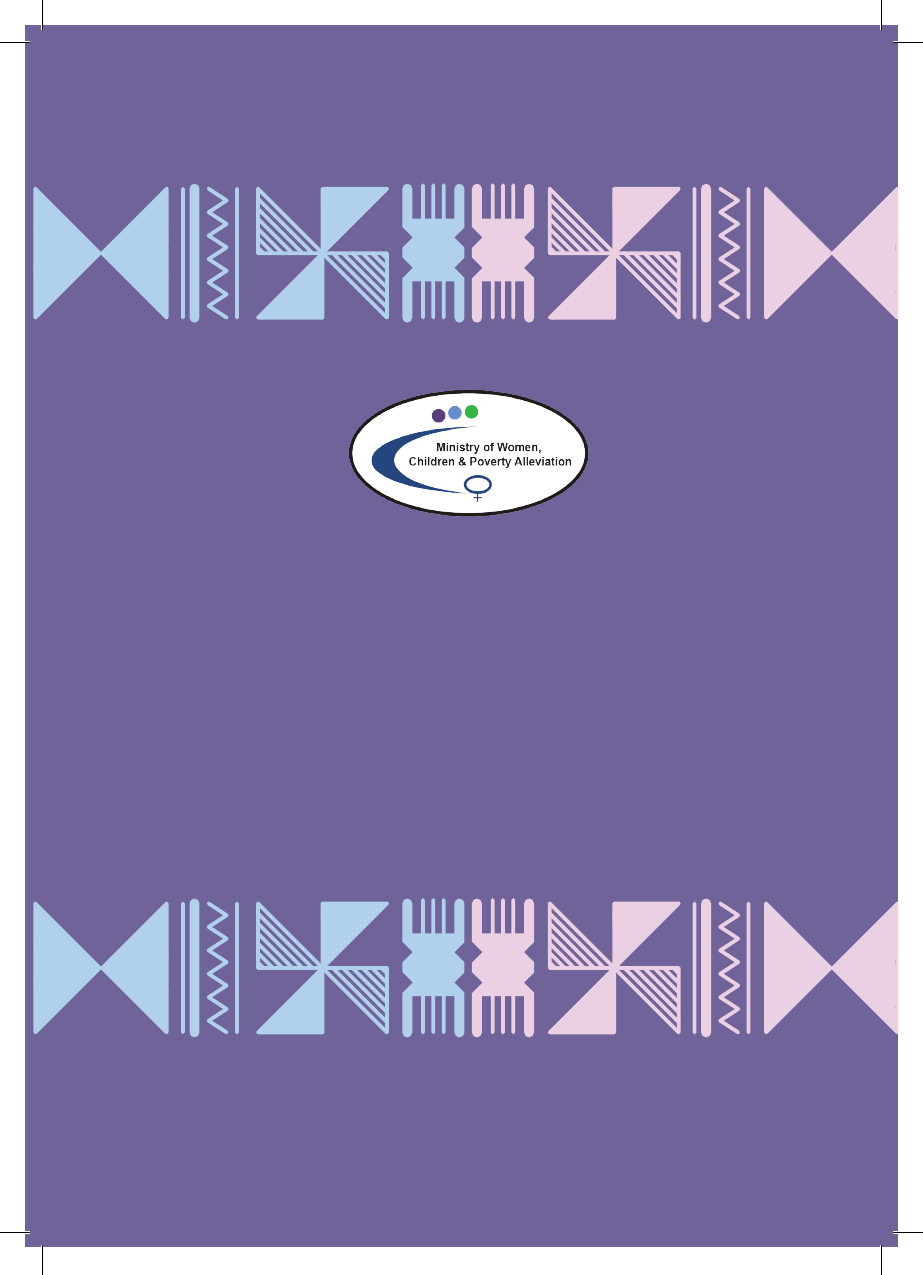
Fiji National Service Delivery Protocol for
Responding to Cases of Gender Based
Violence
Standard Operating Procedures for Interagency Response among
Social Services, Police, Health and Legal/Justice providers
FEBRUARY 2018
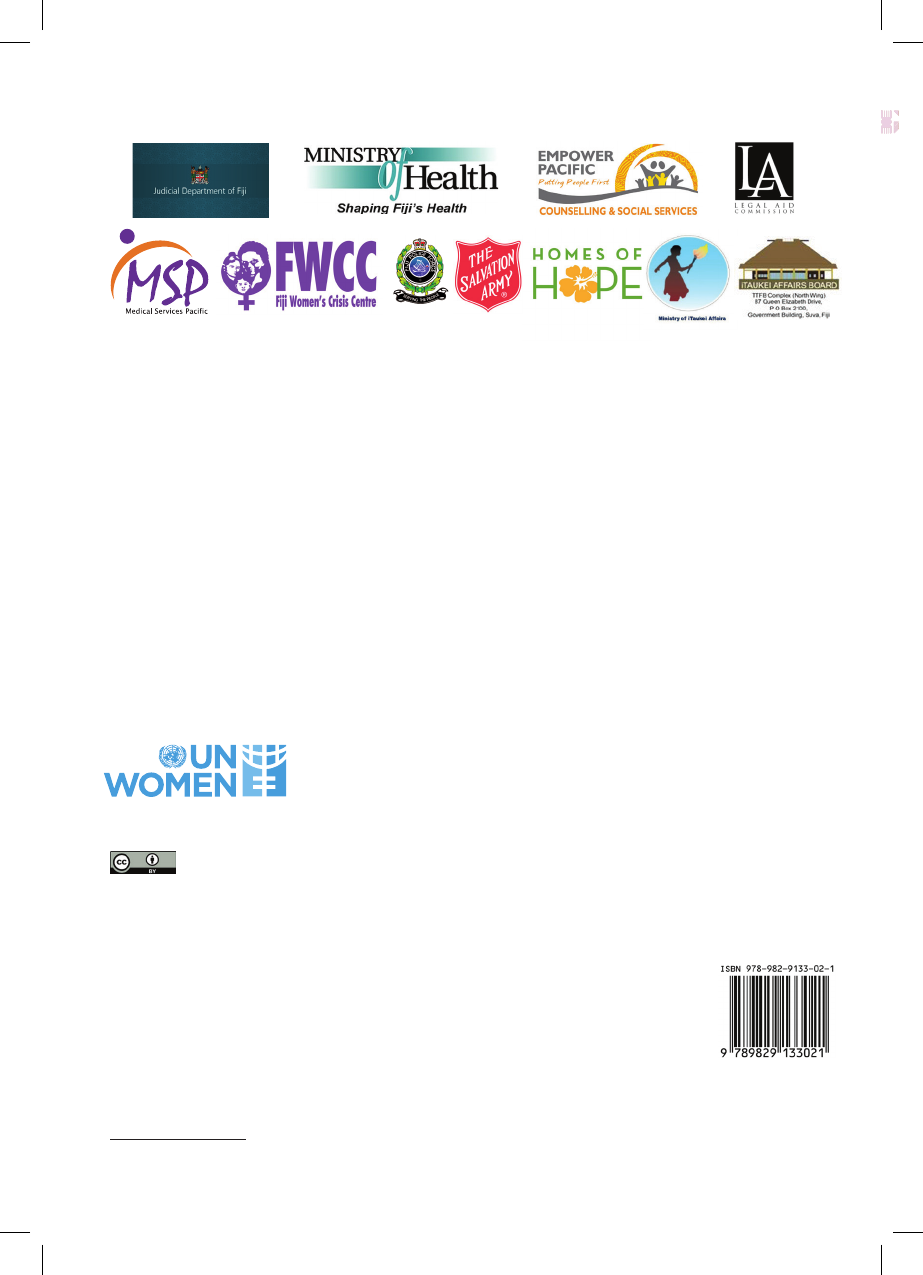
Acknowledgements
This document was developed in collaboration with the following partners:
Ministry of Women, Children and Poverty Alleviation
- Department of Women
- Department of Social Welfare
Ministry of Health and Medical Services
Fiji Police Force
Judicial Department
Ministry of iTaukei Affairs
Legal Aid Commission
Fiji Women’s Crisis Centre
Medical Services Pacic
Empower Pacic
Homes of Hope
The Salvation Army
Developed with technical support and funding support from the UN Women Fiji Multi-Country Ofce (MCO).
1
Copyright
© Fijian Government 2018. Made available under a Creative Commons Attribution 4.0 International
licence. You may share (copy and redistribute the material in any medium or format) and adapt (remix, transform, and
build upon the material) this work for any purpose, even commercially with attribution. For attribution you must give
appropriate credit, and indicate if changes were made. You may do so in any reasonable manner, but not in any way
that suggests the licensor endorses you or your use.
Licence conditions details: https://creativecommons.org/licenses/by/4.0/
Disclaimer: The views expressed in this publication are those of the author(s) and can in no way
be taken to reect the views of the Fijian Government, UN Women, or any supporting partners
or any of their afliated organisations.
1 Developed by Abigail Erikson and Sandrine Tonoukouin. Copy edit by Seona Smiles.

Fiji National Service Delivery Protocol for
Responding to Cases of Gender Based Violence
3
Developed with technical support and funding support from the UN Women Fiji Multi-Country Ofce (MCO).
1
The Government of Fiji is committed to the freedom, safety and wellbeing of all
our citizens. Through pronouncements in our Constitution to our commitments
to international conventions we remain as a nation dedicated to addressing
and eliminating the scourge of gender-based violence (GBV).
The Ministry of Women, Children and Poverty Alleviation (MWCPA) has been
working smartly to deliver on implementing the Fiji National Gender Policy. This
policy has more than 100 activities in 19 key areas and shapes the government
response to working with our partners, stakeholders and our communities
for gender equality, including ending violence against women and children.
Section 5.18 of the Fiji National Gender Policy has guided our government
to work on this important and historic project. “The establishment and
continuation of the Gender-Based Violence Service Protocol to improve the
provision and delivery of services” is perfectly timed with a range of important
steps we are taking to stop violence against women and their children.
The National Service Delivery Protocol is a response that ensures the provision
of appropriate, timely and quality services for survivors of gender-based
violence together with accountability and justice for perpetrators. This binding
agreement for frontline service providers commits them to a common set of
principles and guidelines to ensure survivors of GBV, mostly women and girls,
receive the best care and treatment. We know their health, wellbeing and
recovery is reliant on a shared and common understanding of GBV underpinned
by planning, training, and articulated systems and processes that enable best
practice response and support. The Protocol is one that is well coordinated
discrimination, respect, strong accountability, and zero tolerance for violence.
Message from the Minister for Women,
Children and Poverty Alleviation.

Fiji National Service Delivery Protocol for
Responding to Cases of Gender Based Violence
4
The Fiji Police have recommitted to play an important role in the application of
the Protocol. In protecting survivors, police provide avenues to courts and hold
perpetrators to account by enforcing the strong Fiji anti-domestic violence
and criminal laws. The binding of justice outcomes to the health and recovery
of survivors is a strong feature of this Protocol.
The Protocol offer protection to those who are subjected to these abhorrent
crimes and freedom from continuing harassment. The Protocol will ensure that
better justice outcomes and ongoing safety and security for innocent survivors.
The health and medical service providers as well as our counseling services and
advocacy support to work harmoniously with a survivor-centred approach. It
that we now have what is needed for everyone to play their part in responding
holistically to survivors of gender-based violence.
This National Service Delivery Protocol for Responding to Cases of Gender-
Based Violence has been achieved through extensive consultation across
government and working with existing service providers. I acknowledge the
work of all Stakeholders and UN Women’s Ending Violence Against Women
team, who provided invaluable technical support and coordination during the
process.
Our vision for Fiji is to live feeling safe in our homes, on the streets or at
work with freedom from violence and oppression. I look forward to seeing
this National Service Delivery Protocol help translate this vision into reality,
allowing survivors of gender-based violence to have dignity, health, recovery,
trust and justice with the highest quality response we can deliver.
_______________________
Hon. Mereseini Vuniwaqa
Minister for Women, Children and Poverty Alleviation

Fiji National Service Delivery Protocol for
Responding to Cases of Gender Based Violence
5
Contents
1. INTRODUCTION
1.1 Overview of the Fiji context.…………………………………………………………………………………....8
1.2 Purpose of the Interagency Service Delivery Protocol……………………………..……….13
2. DEFINITIONS, GUIDING PRINCIPLES, MINIMUM STANDARDS
2.1 Denitions of Gender-Based Violence.…………………………………………..........................15
2.2 Survivor-Centred Approach for Working with Individual Survivors………..........23
2.3 Minimum Standards for Service Providers Bound to this Protocol………….…….26
3. REPORTING AND REFERRAL PATHWAY
3.1 Reporting………………………………………………………………………………………………………………….........29
3.2 Condentiality and Information Sharing Procedures…………………………………….....30
3.3 Mandatory Reporting and Exceptions to Condentiality………………………………...32
3.4 Informed Consent……………………………………………………………………………………………………......33
3.4.1 Special Procedures for Informed Consent and Children..……………………………..36
3.4.2 Special Notes on Consent for Persons with
Compromised Competency....................................................................................36
3.5 Making Referrals.................................……………………....……………………………………………......36
3.6 Help Seeking and Referral Pathway……………………………………………………………………......39
3.7 No Drop Policy………………………………………………………………………………………………………….......39
3.8 Reporting in Media…………………………………………………………………………………………….….......40
4. ROLES AND RESPONSIBILITIES OF SERVICE PROVIDERS
Frontline Service Provision
4.1 Health and Medical Response………………………………………………………………………..………...42
4.2 Counselling and Survivor Advocacy Response…………………………………………..……….46
4.3 Safe Shelter Accommodation……………………………………………………………………………..…...48
4.4 Police Response……………………………………………………………………………………………….………......50
4.5 Social Welfare Department/Child Protection………………...………........................…….53
4.6 Legal Aid Commission……………………………………………………………………………………….…….....55
4.7. Judicial Department……………………………………………………………………………………………..….....56

Fiji National Service Delivery Protocol for
Responding to Cases of Gender Based Violence
6
Coordination and Governance
4.8 Ministry of Women, Children and Poverty Alleviation, Women’s Division.…60
4.9 Ministry of iTaukei Affairs – iTaukei Affairs Board………………………….………………….....61
5. STANDARDS AND TRAINING FOR GBV COUNSELLORS
5.1 Standards for GBV Counsellors…………………………………………………………………………..….....62
5.2 Training Requirements…………………………………………………………………………………………........64
5.3 Training and Wellbeing of Counsellors and other GBV Caregivers…………..….68
SIGNATURE OF UNDERSTANDING...............................................................................70
ANNEXURES
Annex 1: Directory of Key GBV Service providing Agencies....................................72
Annex 2: Actors who informed the service delivery protocol...................................76
Annex 3: Domestic Violence Restraining Order (DVRO) FORM............................80
Annex 4: Domestic Violence Complaints Notice.........................................................87
Annex 5: Child Welfare Act Notication Form..............................................................90
Annex 6: GBV Referral Pathway Developed for Emergencies/Disasters...............92

Fiji National Service Delivery Protocol for
Responding to Cases of Gender Based Violence
7
1. INTRODUCTION
1.1. Overview of the Fiji Context
Violence against Women and Girls: What the data tells us
Violence against women and girls is recognized worldwide as a social,
political, and public health problem as well as a fundamental violation
of human rights, with 1 out of every 3 women experiencing physical or
sexual violence in their lifetime. In Fiji, 64% of Fijian women (almost 2 in 3)
aged 18-49 who have ever been in an intimate relationship experienced
physical and/or sexual violence or both by a husband or intimate partner
in their lifetime – almost double the global average.
This statistic, coming from the national Violence Against Women (VAW)
prevalence study conducted by the Fiji Women’s Crisis Centre (FWCC),
published in 2013,¹ highlights the serious and pervasive problem of
gender-based violence (GBV). The main forms of violence reported
by Fijian women over the course of a lifetime are physical, sexual and
emotional abuse by an intimate partner; sexual assault; and sexual
harassment. Physical violence is the most widespread over a woman’s
lifetime in Fiji, with 61% of all ever-partnered women (more than 3 in 5)
experiencing it, compared with 58% experiencing emotional violence and
34% (more than 1 in 3) experiencing sexual violence (FWCC 2013). See
Figure 4.1 below.
Source: (FWCC 2013, 37) Tables 4.1 and 4.9 of Annex 1.
¹ Fiji Women’s Crisis Centre. 2013 Somebody’s Life, Everybody’s Business! National Research on Women’s Health and
Life Experiences in Fiji (2010-2011). A survey exploring the prevalence, Incidence and Attitudes Towards Intimate partner
violence in Fiji.

Fiji National Service Delivery Protocol for
Responding to Cases of Gender Based Violence
8
Women in Fiji have reported that most of this violence takes place in
the home. The national prevalence study conducted by FWCC shows
that 80% of women have witnessed some form of violence in the home;
66% of women have been physically abused by partners and nearly
half repeatedly abused, while 26% of women have been beaten while
pregnant (FWCC 2013)
2
.
While women in Fiji are at risk of violence perpetrated by husbands/
intimate partners at any age, national prevalence data shows that younger
women in Fiji aged 18-29 are at a much higher current risk of experiencing
partner violence than older women (physical, sexual violence and abuse).
physical or sexual abuse.
3
Fiji’s national prevalence study found that 69% of women from i-Taukei
communities experience physical assault from their intimate partners in
their lifetime, compared with 47% from Indo-Fijian communities and 61%
for the country-as-a-whole. However, although the prevalence for Indo-
Fijian women is lower than for other ethnic groups in Fiji, the data also
shows that the lifetime prevalence of physical and/or sexual violence
for Indo-Fijian women is higher than the global prevalence of 30%
(WHO 2013). Taking these prevalence rates and the national population
breakdown into account, police data also shows that women from i-Taukei
communities are less likely to report physical domestic assault than Indo-
Fijian women (FWCC 2013).
4
According to the study, the survivor knew the perpetrator in 94% of child
abuse cases and 70% of reported rape cases. Male family members,
excluding fathers and step-fathers, constitute the largest group of
perpetrators or rape, attempted rape and child sexual abuse in Fiji at
45 %. For instances of child sexual abuse, the second highest group of
perpetrators is strangers with 15%, followed by male friends of the family
members with 4%.
2
ibd
3
ibd
4
ibd

Fiji National Service Delivery Protocol for
Responding to Cases of Gender Based Violence
9
National Frameworks and Current Responses
The Ministry of Women, Children & Poverty Alleviation (MWCPA) is tasked
with addressing gender equality, the empowerment of women and the
disadvantaged, responsibility for the care and protection of children,
and addressing the needs of women and children within all spheres of
Fijian society. With its Women’s Action Plan (2010-2019), the Ministry has
committed to align its work and focus areas the sustainable development
goals (SDGs), Beijing Platform for action in 1995 and several other
regional and international action plans. The MWCPA is responsible for
monitoring of government initiatives and drafting of new policy that will
Discrimination Against Women (CEDAW). Fiji is also a signatory to
safeguarding women and children’s human rights:
» The Convention on the Rights of the Child;
» The Jakarta Declaration for the Advancement of Women in Asia and
» The Commonwealth Plan of Action for Gender Equality 2005–2015
arising from the 7th meeting of Commonwealth Ministers responsible
for Women’s Affairs;
»
Ministers responsible for women, and the 9th Triennial Conference on
»
in 2015).
In 2013, the MWCPA re-established the Elimination of Violence Against
Women (EVAW) Taskforce which is comprised of key government
stakeholder, NGO partners and development agencies. The EVAW

Fiji National Service Delivery Protocol for
Responding to Cases of Gender Based Violence
10
Taskforce’s main responsibility is to advance policies and programming
to improve services for survivors of violence against women. In support
of the implementation of the Fiji National Gender Policy and through
the collaboration of its members, the EVAW taskforce has developed this
standard Interagency Service Delivery Protocol for responding to cases
of gender-based violence across the primary sectors responsible: health,
social services, police and justice.
Additionally in 2013, Fiji made national commitments to addressing
the issues of VAWG before the Commission on the Status of Women.
Fiji made commitments to address gender based violence through the
implementation of the National Women’s Plan of Action 2010 – 2019,
thematic areas of concern. One of those commitments was to develop
across key sectors following commitments were made:
» The Fiji Police Force commits to: a) providing a 24-hour turn-around
time on serious cases of violence against women and children; b)
Improving response time by increasing the percentage of female
women and children and share this information on a quarterly basis
with the Ministry; and d) to mainstream gender into all areas of the
police force, including recruitment, training, promotion and decision
making processes.
» Fiji will prioritize building capacity for front line health care workers
to respond to violence against women and children holistically with
medical management, referrals, counseling and appropriate treatment.
» Under the Child Welfare Decree 2010, Fiji committed to ensuring that
that all health personnel and teachers are mandated to report any case
of suspected violence against children presented to them in health
clinics or detected in schools.

Fiji National Service Delivery Protocol for
Responding to Cases of Gender Based Violence
11
The existing national protocols, policies and laws that are in line with the
steps and procedures outlined in this Protocol include:
» The Fiji National Gender Policy. Paragraph 5.18 of Gender Policy
“Ensure the establishment and continuation of the
Gender Based Violence Service Protocol to improve the provision and
delivery of services to victims of gender based violence and individuals
who are either vulnerable to domestic abuse or are likely to suffer harm
due to physical, sexual, emotional or psychological abuse and /or
neglect. “
» The Fiji Ministry of Health and Medical Services clinical guidelines
to ensure GBV cases are approached by health workers in a uniform
manner, Responding to Intimate Partner Violence and Sexual Violence
against Women and Girls, (2015).
» Fiji Interagency Guidelines (IAG) on Child Abuse and Neglect.
» The Fiji Ministry of Education has a Child Protection Policy with zero
tolerance for child abuse, and includes mandatory reporting obligations
(Fiji Ministry of Education 2012).
» Fiji’s legal framework to address gender-based violence and reinforce
women and children’s human rights is comprised of the Family Law Act
(2003), the Domestic Violence Act (2009), the Crimes Act (2009), the
Juvenile Act (1974) and the Child Welfare Act (2010).
» The Family Law Act (2003) established a Family Court and covers
marriage, divorce, maintenance, and custody.
» The Domestic Violence Act (2009) is meant to provide greater
protection from domestic violence and clarify the roles and duties
of the police in that regard.
» The Crimes Act (2009) was formally known as the Penal Code of Fiji.
» The Child Welfare Act (2010) is meant to ensure the mandatory
reporting of possible, likely or actual harm of child abuse as well
as emphasize the duty of care of professionals in handling cases of
child abuse.

Fiji National Service Delivery Protocol for
Responding to Cases of Gender Based Violence
12
» The Fiji Police Force has had a ‘No Drop Policy’ for domestic violence
means that the victim/survivor cannot withdraw or drop a complaint
after it has been made to the police. The genesis of this policy was to
address the risk of undue pressure being placed on victim/survivors
by perpetrators, the perpetrator’s family or others acting on the
perpetrators behalf to withdraw their statement or complaint. The
effect of police continuing with their prosecution relieves victim/
survivors of this burden. The Fiji Police Force is required by law
to fully investigate all cases of domestic violence and bring the
under no circumstance permitted to reconcile perpetrators with
victims.
1.2. Purpose Of The Interagency Service Delivery Protocol
The primary purpose of the Interagency Service Delivery Protocol
(hereafter referred to as the ‘Protocol’) is to outline overall guidelines
for standard operating procedures for interagency response to gender-
based violence.
The evidence shows that gender-based violence is a serious issue in
Fiji and standard operating procedures for responding to cases across
agencies and sectors is critical to a successful response. Currently, reports
to police, health and social services remains low due to stigma, fear, shame,
high levels of community tolerance of violence, inadequate response from
police and legal services, and lack of access to services in some rural areas
and smaller communities, with limited options or support to escape the
violence. A well-coordinated response across agencies responding to
individual cases will improve practice and encourage more women and
girls to come forward.
This Protocol provides guidance on key aspects of response and service
delivery, including:

Fiji National Service Delivery Protocol for
Responding to Cases of Gender Based Violence
13
» Outlining best practice and minimum standards for a survivor centred
approach to service delivery.
» Guiding principles and minimum standards for ethically and safely
GBV, to prevent further victimization of the survivor by service providers.
» Agreed referral pathways which adhere to minimum standards for
responding to GBV survivors.
» Outlining of the key roles and responsibilities of multi-sectoral service
providers, including health, social services, police and legal aid.
This includes the responsibility for service delivery coordination and
governance.
»
informed consent and mandatory reporting guidelines and procedures.
»
line with the Fiji Interagency Guidelines on Child Abuse and Neglect.
» Ensuring an inclusive response for diverse populations, including
women and girls with disabilities, as well as lesbian, bi-sexual, and trans
women.

Fiji National Service Delivery Protocol for
Responding to Cases of Gender Based Violence
14
2. DEFINITIONS, GUIDING PRINCIPLES,
MINIMUM STANDARDS
Note About Language:
» Certain terms will be used interchangeably throughout this text. For
example, the terms victim and survivor are both used, though where
possible the word survivor is used. Both terms refer to a person who
has experienced gender-based violence.
» The terms patient or client will also be used interchangeably. Different
people use these words to describe the same thing: a person in their
care who is receiving services to help them after they have suffered
violence. ‘Patient’ is the word often used in the health sector while
‘client’ is used in counselling and social service sectors.
» Because women and girls experience the highest rates of gender-based
violence, the Protocol uses female pronouns ‘her’ or ‘she’ throughout
this document. However, it is recognised that men and boys can also
experience gender-based violence and the guidance given in this
Protocol can be used for male survivors.
2.1. Definitions of Gender-Based Violence
Gender-based violence (GBV) is an umbrella term for any harmful act that
is perpetrated against a person’s will and is based on usually accepted
differences between males and females that are socially ascribed (i.e.
gender). GBV is most commonly used to underscore how the inequality
accepted between males and females in our society acts as a unifying
characteristic of most forms of violence against women and girls. The
United Nations Declaration on the Elimination of Violence against Women
based violence that results in, or is likely to result in, physical, sexual or
psychological harm or suffering to women.”

Fiji National Service Delivery Protocol for
Responding to Cases of Gender Based Violence
15
Gender discrimination is not only a cause of many forms of violence against
women and girls but also contributes to the widespread acceptance and
invisibility of such violence—so that perpetrators are not held accountable
and survivors are discouraged from speaking out and accessing support.
In all types of GBV, violence is used mostly by males against females to
subordinate, disempower, punish or control. Whereas violence against
men is more likely to be committed by an acquaintance or stranger,
women more often experience violence at the hands of those who are
well known to them: intimate partners, family members. ³
When violence occurs, it is because a person (the perpetrator) is exerting
power over another (the victim) to obtain control over that person. While
this control can take on many different forms, the common thread to all
types of violence is that it is founded on the dynamic of exerting power to
gain control.
Similarly, in the case of violence perpetrated against a woman or girl, the
gender, because she is a woman or girl, and for this reason is considered
to belong to the “less powerful and less valuable” gender.
Acts of gender-based violence addressed in this Protocol shall be
understood to encompass, but not be limited to the following:
A. Physical, sexual and psychological violence occurring in the family,
including battering, sexual exploitation, sexual abuse of children in
the household, marital rape
B. Physical, sexual and psychological violence occurring within the
general community, including rape, sexual abuse, sexual harassment
and intimidation at work, in education institutions and elsewhere,
³ Guidelines for Integrating Gender-Based Violence Interventions in Humanitarian Settings. Reducing risk, promoting resilience
and aiding recovery. IASC, 2015

Fiji National Service Delivery Protocol for
Responding to Cases of Gender Based Violence
16
Under Fijian law, namely the Domestic Violence Act (2009), the Crimes
Act (2009) and the Child Welfare Act (2010), most of these acts of gender-
Domestic Violence (DV):
Violence against a person (“the victim”) committed, directed or undertaken
by a person (“the perpetrator”) with whom the victim is with, or has been
with, in a family or domestic relationship.
Violence can include threatened or actual physical injury, sexual abuse,
damaging or threatening to damage property, other threatening,
intimidating or harassing behaviour, and causing or allowing a child to
see or hear violence.
A family or domestic relationship means the relationship of spouse, other
family member, person who normally or regularly lives in the household
or residential facility, boyfriend or girlfriend, person who is wholly or partly
dependent on ongoing paid or unpaid care or a person who provides
such care.
Both domestic and intimate partner violence involves close familiarity. In
fact, while exerting power over his victim, the abuser uses the bonds of
closeness and intimacy that have been built over time in the relationship
Intimate Partner Violence (IPV):
IPV, however it is important for all GBV service providers to know and
understand IPV.
Intimate “partner violence” is behaviour by an intimate partner that
causes physical, sexual or psychological harm, including acts of physical
aggression, sexual coercion, psychological abuse and controlling
behaviours. IPV includes violence by both current and former spouses and
other intimate partnerships, such as dating. Dating violence is included in

Fiji National Service Delivery Protocol for
Responding to Cases of Gender Based Violence
17
IPV as it refers to an intimate relationship between two people of varying
duration and intensity and which does not necessarily involve cohabitation.
IPV is oftentimes referred to as ‘domestic violence’.
A particularity common to both Domestic and Intimate Partner Violence
is close familiarity. In fact, while exerting power over his victim, the abuser
uses the bonds of closeness and intimacy that have been built over time
in the relationship to gain control over the victim. Bonds of intimacy are
two people.
Sexual Violence:
Any sexual act, attempt to obtain a sexual act, unwanted sexual comments
sex with others, or actions otherwise directed against a person’s sexuality,
using coercion or persuasion by a person, regardless of their relationship
to the victim, in any setting, including, but not limited to home and work.
Like other types of gender-based violence, sexual violence results in or is
likely to result in physical, psychological and emotional harm.
Acts of sexual violence include:
» rape, other forms of sexual assault;
» unwanted sexual advances or sexual harassment (including
demands for sex in exchange for job promotion or advancement or
higher school marks or grades);
»
» forced exposure to pornography;
» forced pregnancy, forced sterilization, forced abortion;
» forced marriage, early/child marriage;
» female genital mutilation;
» virginity testing; and
» incest.

Fiji National Service Delivery Protocol for
Responding to Cases of Gender Based Violence
18
The Crimes Act (2009) recognizes the severity of sexual violence and has
(1) A person (the perpetrator) commits an indictable offence if
(a) the perpetrator does either of the following:
i. commits an act or acts of a sexual nature against one or more
persons;
ii. causes one or more persons to engage in an act or acts of a sexual
nature; without the consent of the person or persons, including by
being reckless as to whether there is consent; and
(b) the perpetrator’s conduct is of a gravity comparable to the
offences referred to in sections 88 to 92; and
(c) the perpetrator’s conduct is committed intentionally or knowingly
as part of a widespread or systematic attack directed against a
civilian population.
Rape:
(2) A person rapes another person if:
(a) the person has carnal knowledge with or of the other person without
the other person’s consent; or
(b) the person penetrates the vulva, vagina or anus of the other person to
any extent with a thing or a part of the person’s body that is not a penis
without the other person’s consent; or
(c) the person penetrates the mouth of the other person to any extent with
the person’s penis without the other person’s consent.
(3) For this section, a child under the age of 13 years is incapable of giving
consent.
penetration of a person’s vulva, vagina, anus, mouth or any other part of
the body by a penis, object or any other part of the perpetrator’s body that

Fiji National Service Delivery Protocol for
Responding to Cases of Gender Based Violence
19
“free and voluntary agreement”; because the victim is incapable of giving
genuine consent due to age or due to a coercive environment.
Sexual Assault: A subcategory of sexual violence, sexual assault is any
form of sexual contact without consent. Sexual assault includes rape as
4
Physical Violence: Physical force that results in bodily injury, pain, or
impairment. The severity of injury ranges from minimal tissue damage,
broken bones to permanent injury and death. Acts of physical violence
include:
4
» slapping, shoving, pushing, punching, beating, scratching
» choking, biting, grabbing, shaking, spitting, burning, maiming
» twisting of a body part, forcing the ingestion of an unwanted
substance; restraining a woman to prevent her from seeking medical
treatment or other help; and using household objects to hit or stab
a woman, and using weapons (knives, guns).
Emotional/Psychological/Verbal Violence: Emotional abuse includes
non-physical, non-sexual behaviours such as threats, insults, constant
monitoring or “checking in”, stalking, excessive texting, humiliation,
restriction of the right to free movement or deprivation of liberty.
4
Economic/Financial Abuse: Economic abuse is behaviour that is coercive,
deceptive or unreasonably controls another without their consent and in a
support necessary to meet reasonable living expenses like food, water
»
» forcing a woman to quit her job
»
» forcing a woman to work to pay back ‘debt’.
4
Responding to Intimate Partner Violence and Sexual Violence Against Women and Girls (MOH 2014)

Fiji National Service Delivery Protocol for
Responding to Cases of Gender Based Violence
20
Child Abuse: In Fijian law, a “child” is a person below the age of 18 years.
Child abuse is all forms of physical and/ or emotional ill-treatment, sexual
abuse, neglect or negligent treatment or commercial or other exploitation
resulting in actual or potential harm to the child’s health, survival,
development or dignity in the context of a relationship of responsibility,
trust or power. Allowing or causing a child to see or hear domestic
six categories – child physical abuse; child sexual abuse; child neglect
and negligent treatment; child emotional abuse; child exploitation and
exposure to DV. Child maltreatment is an alternative term to child abuse.
Child Sexual Abuse: Any act during which a child is used for sexual
power, authority and control over that child. Child sexual abuse can be
committed by a parent, sibling, extended family member, teacher, leader,
friend, stranger or any other caregiver.
Incest: In many cases, incest is included as an act of child sexual abuse
as it is committed by someone the child trusts or who is in a position of
power, authority and control over that child. The Fiji Crimes Act (2009)
states that - 223:
(1) Any person who has carnal knowledge of another person, who
is to his or her knowledge in a relationship to him or her of parent,
grandparent, child, sister or brother, is guilty of an indictable offence.
(2) It is immaterial that the carnal knowledge was had with the
consent of the other person.
(5) for the purposes of this section, “brother” and “sister” respectively
include half-brother and half-sister.
Early/Forced Marriage: In Fiji, arranged marriage or any marriage under
the age of legal consent (18 years old) is illegal. In the past, under section
12 of the Marriage Act Cap 50 the marriageable age for males was 18 years
old but for females it was 16 years old with the consent of the parents.
was required was for her to be 16 years or older and to have consent from
her parents. The young girl’s consent was not a requirement. The Marriage

Fiji National Service Delivery Protocol for
Responding to Cases of Gender Based Violence
21
the marriageable age is 18 years old regardless of gender and the young
woman’s consent is absolutely necessary to having a valid marriage under
the law.
Sexual Exploitation: Committed by a person in a position of power,
exploitation is the abuse of that power and the vulnerable person’s trust
from the sexual exploitation of another. Acts of sexual exploitation include:
servitude.
Trafcking:
of the entry, exit, proposed entry or exit, or receipt of another person with
obtain the victim’s compliance in respect to that actual or proposed exit or entry.
Sexual Harassment: Under Section 213 of Crimes Act (2009) and under
Section 4 of Employment Relations Promulgation (EPR) (2007) criminalises
sexual harassment.
Sexual harassment is any unwelcome, unreciprocated sexual advance,
unsolicited sexual attention, demand for sexual access or favours, sexual
innuendo or other verbal or physical conduct of a sexual nature, or display
of pornographic material. Sexual harassment can take place anywhere, in
the streets, at work, school, etc.
Note:
It is important to note that although this document refers to GBV
as disproportionately perpetrated against women and girls, it
does not exclude the very real fact that young boys and men also
experience gender based violence. For example, young boys may
become subjected to violence, abuse and neglect at the hands of
sexual exploitation. The contents of this documents should also be
applied to such cases.

Fiji National Service Delivery Protocol for
Responding to Cases of Gender Based Violence
22
2.2. Survivor-Centred Approach for Working with
Individual Survivors
Agencies providing direct services to survivors of violence must make sure
that frontline staff responding to individual cases use a survivor-centred
approach. This is an approach that recognises and prioritises a survivor’s
needs, wishes, rights, equality and diversity. Keeping the survivor as the
focus and centre of your support allows her to be empowered, feel cared
and personal integrity more quickly.
A survivor-centred approach requires professionals to keep to the
following principles while working with individual survivors:
» Safety: Safeguarding the physical and emotional safety of the survivor
is critically important during all parts of service delivery. All actions
taken on behalf of the survivor must safeguard the survivor’s physical
and emotional well-being in the short and long term, both during the
process where support and help is being offered and when she is at
home or in the community. The following actions can help increase
safety for a survivor:
» using a same-sex service provider except for small children for
whom a female service provider is most often the best choice
» using a same-sex interpreter
» allowing ample space between service provider and survivor, not
sitting or standing too close together
» do not have any unnecessary physical contact with survivor
» speak with your inside-voice and hold interviews in a private place
» contact police or emergency services when a survivor is in very
serious and immediate or imminent danger of injury during the
intervention (see Section 3.1)
» ensure certain emotional safety, which includes ensuring that the
survivor is safe from suicide, self-harm, depression and other mental
health concerns.

Fiji National Service Delivery Protocol for
Responding to Cases of Gender Based Violence
23
» Empowerment: Given that one of the core experiences of GBV
is disempowerment, at the centre of the survivor’s recovery is
empowerment. The relationship between the service provider and
the survivor must be about restoring power and control back to the
to her ‘power within’— the strength that arises from within herself when
she recognises abuses of power and her own power to start a positive
process of change for herself. Service providers must emphasise choice
For example,
service providers (other than the police) should not start reporting to
the police or any other service provider against the wishes of a survivor
who is 18 years or older. Exceptions are made in cases where there is
potential danger to that person or another person. These exceptions to
» Respect the wishes, rights, and dignity of the survivor in all actions
taken. Respect involves understanding that the survivor is the main
person and expert in the relationship of care. This means asking about
and following what the survivor sets for her boundaries, how far she
wants take matters, the rhythm of how she wants to do things, and not
putting pressure on her or not forcing to say or do something she is
not comfortable doing (i.e. giving her consent for something). Respect
also involves believing the survivor when she speaks about abuse,
actively listening to what she says, being patient, not interrupting or
abruptly changing the topic of conversation, not causing her to repeat
her stories many times and, most importantly, not making personal
judgments about the survivor’s decisions.
» Maintain Appropriate Condentiality: This ethical principle requires
that service providers involved in the care and treatment of a survivor
protect information gathered about clients and agree to only share
information about a client’s case with the clients clearly understood
of information during interviews; 2) that sharing information happens
on a ‘need to know’ basis or in line with laws and policies, and that
permission is obtained from the survivor before information is shared;

Fiji National Service Delivery Protocol for
Responding to Cases of Gender Based Violence
24
3) only the details relevant to the referral are shared with another
helper, in-line with the survivors consent; 4) case information is stored
never discuss case details with family and friends, or with colleagues
and workmates who do not need to know about it.
» Non-Discrimination: Every adult and child, regardless of his/her sex,
should be accorded equal care and support. Survivors of violence
should receive equal and fair treatment regardless of their sex, race,
ethnicity, religion, age, disability, nationality, sexual orientation or
gender identity or any other differentiating feature. For this, service
providers must make sure that their personal beliefs, assumptions
and attitudes do not interfere during interventions with survivors.
This also means that service providers who are known to the survivor
must treat them fairly and equally and, if it is in the best interest of the
survivor, refer them to a different person within your organisation to
assist. Service providers must ensure that case workers regularly do
» Empathy: Empathy is the ability to understand and share the feelings
of another. When responding to GBV cases, service providers must show
their ability to have and feel empathy for the survivor. Empathy for a survivor
is not the same as sympathy or pity which can prevent the survivor from
utilising their own power to be able to heal. Empathy needs the provision
of comfort, validation and encouragement to adult and child survivors of
violence and abuse.
» Best Interest of the Child: Children have the right to be involved in decisions
that affect them and service providers must share information with children in
a way they understand, depending on the age and developmental stage of
the individual child. The best interest of the child is the action that best ensures
the child’s safety and wellbeing, and is the primary consideration in all actions
affecting children. Making decisions relating to children can be complex and
difficult. Service providers must follow their child protection policies and seek
guidance from their immediate supervisor.

Fiji National Service Delivery Protocol for
Responding to Cases of Gender Based Violence
25
2.3. Minimum Standards for Service Providers Bound to this
Protocol
The Protocol maps out in detail how to respond and refer cases of
gender-based violence as well as outlining a clear pathway for helping
a survivor seek the help she needs across multiple agencies. At the very
least, agencies included in the Protocol agree to the following minimum
standards, building on the guiding principles listed above and a survivor-
centred response:
1. Minimum Standard 1: Zero Tolerance and Accountability for
Violence
There is ZERO tolerance for gender-based violence and such violence
will be publicly condemned as a violation of a woman, girl or child’s
basic human rights. This includes challenging, with sensitivity and
respect, cultural and religious practices that are harmful to women
and girls and that take away the focus from making the perpetrator
accountable for the violence. Zero tolerance for violence also means
making sure that perpetrators are held accountable for their violence
through swift action by police and those in the justice system.
2. Minimum Standard 2: Survivor-Centred Approach
As described above, service providers will adhere to a survivor-centred
response action puts survivors, their families and/or service providers
into further harm. Other key elements of a survivor-centred approach
of survivors. As such, service providers should be absolutely sure that
Agency Policies to be consistent with this protocol: All Agencies
to these standards while working in the GBV service delivery
environment.

Fiji National Service Delivery Protocol for
Responding to Cases of Gender Based Violence
26
client information only be shared on a ‘need to know’ basis and with
the informed consent and agreement of the survivor. Service providers
should regard and interact with all survivors with the utmost respect for
the survivor’s situation, context, identity, individual agency and ability
to make the best decisions for themselves (for adults). To successfully
regard survivors with respect and empower them with much-needed
support, care and critical GBV related information, service providers
will need to demonstrate genuine empathy and concentrate on the
survivor’s needs rather than their own.
3. Minimum Standard 3: Best Interest of the Survivor (over Community
or Agency Interest)
It is crucially important to make sure that the best interests of the survivor
focus and preoccupation of each and every service provider and agency
who comes in contact with her. The need to promote and secure the
interests, image and reputation of the organisation and its staff should
and empowerment of the survivor. This means that cultural practices
that are harmful to women and girls should always be approached and
challenged with respect, sensitivity and care. Furthermore, in cases of
protection and wellbeing of the survivor.
4. Minimum Standard 4: Inclusive Services
Service providers should not discriminate based on sex, sexual
orientation, gender identity, race, religion, age, disability, ethnicity, or
any other differentiating feature. Services should be offered equally,
without judgement or bias to all survivors, including lesbian, gay,
and people with disabilities. Service providers should be trained and
knowledgeable on how to best support diverse women and girls and
the many complex ways in which they can and do experience violence.

Fiji National Service Delivery Protocol for
Responding to Cases of Gender Based Violence
27
This will enable service providers to be competent, ready and able
to provide rights-based services and support to diverse people who
experience violence.
5. Minimum Standard 5: Coordination and Referral
In recognition of the multiple needs of survivors, service providers in this
including: counselling, survivor advocacy and case management;
medical care; shelter services; safety and security; and child protection.
This Service Delivery Protocol facilitates a coordinated, formal referral
system that uses simple processes and procedures to support
survivors’ healing and recovery. A central aim of a well-coordinated
and integrated service delivery system is to avoid re-victimising the
survivor through duplication and repetition (i.e. asking questions more
than once).
6. Minimum Standard 6: Timely Response
Service providers will offer timely support to survivors and will do
their best to respond to a case of gender-based violence as quickly
as possible. For example, if a survivor reports to the hospital or police
station, she should be seen immediately with little delay.
7. Minimum Standard 7: Advocacy and Prevention
Service providers, as much as possible, will be involved in prevention and
advocacy activities that challenge harmful gender norms and help people
to better understand gender equality and power relations that respect the
rights of women and girls and promote zero tolerance of violence.

Fiji National Service Delivery Protocol for
Responding to Cases of Gender Based Violence
28
3. REPORTING AND REFERRAL PATHWAY
3.1. Reporting
A survivor of gender-based violence has the right to report the violence to
anyone she chooses, and anyone who is approached by a survivor of GBV
for assistance should provide objective and comprehensive information
to the survivor on services available in the community. In Fiji, the most
police. However, a survivor may report to anyone who she feels will be the
most helpful including: religious and community leaders, school teachers,
parents, peers, friends, health care providers and NGO service providers.
Community and religious leaders, teachers or other key community
members may receive direct reports of GBV and if so, have a duty to
provide objective and comprehensive information to the survivor on the
services available as outlined in this Protocol.
Community leaders who receive a report of GBV should refer a survivor,
with her permission, to health, police, counselling/advocacy, legal aid/
court services that are available in the area.
The person the survivor reported to should escort the survivor to a service
provider if she wishes.
Anyone who receives reports is obligated to keep information related to
release such information to receive ethical and appropriate services.
An adult survivor has the right to choose to not formally report an incident
(i.e. report to the police), but should still be supported in any way possible,
as she chooses.

Fiji National Service Delivery Protocol for
Responding to Cases of Gender Based Violence
29
3.2. Confidentiality and Information Sharing Procedures
information about the survivor’s case will only be shared with individuals
and/or organisations helping and as requested and agreed by the survivor.
Why is There a Need for Condentiality?
any misinterpretation of facts, and/or distortion or malicious use of the
information. People do not hear things in the same way and interpret
put people’s lives at risk and puts at extreme risk the ability of the service
provider to support a survivor’s healing and recovery.
Condentiality and Information Sharing Protocols
be respected at all times. In practice this means:
» interviews will be conducted in a private setting
» information will only be shared internally and externally on a ‘need
to know’ basis and only with individuals and/or organisations
providing assistance and as requested and agreed by the survivor
» people assisting with GBV cases cannot discuss any case information
with family, friends or co-workers who are not involved with the case
» Only non-identifying data will be shared in public documents and
reports. The exceptions are case management meetings when
identifying information may be used, but only with the consent of
the survivor and to support case actions
» Survivor consent is needed to share case information and must be
Republic of Fiji Islands Government Gazette, Child Welfare Act 2010. Act No. 41 of 2010.

Fiji National Service Delivery Protocol for
Responding to Cases of Gender Based Violence
30
» explain to survivors how information will be shared and stored
in your agency and in each of the agencies being referred to
» Seek the survivors’ consent to collect and store information.
»
» All written information with identifying details must be kept in
Condentiality procedures for collecting, storing and using personally
identiable information:
» records of the survivor should only be accessed by pre-approved
professionals within the organisation. Access can be granted after
discussion with the relevant persons authorised/ relevant people
outside the organisation (with the informed consent of the survivor)
or at the direction of the courts. The survivor has the right to deny
access to certain groups if she wishes (this should be noted on the
consent form)
» photographic records should be avoided. In cases where this done,
it should only be undertaken by the police or a registered medical
this information must be strictly monitored as indiscriminate use of
this record may violate the survivor’s right to dignity and privacy. It
destroyed when the case is closed
» in cases where case studies are used by an organisation for
» personal details of cases may not be used for marketing purposes
by the agencies concerned
» client data that is collected for monitoring case data should be non-

Fiji National Service Delivery Protocol for
Responding to Cases of Gender Based Violence
31
3.3. Mandatory Reporting and Exceptions to
Confidentiality
There are some instances where there is a legal and ethical obligation
to report cases of gender-based violence to service providers, even if
the individual does not give their consent to do so. These exceptions to
violence is indicated include:
» when the survivor is a child and/or in cases where there is likely to
be harm affecting the health and welfare of children
» if the survivor is at risk of harming herself (possibly suicidal) or if the
survivor is at risk of harming another person (possibly homicidal)
» if the survivor is in very serious and immediate danger
» when the woman requires urgent medical attention. For example,
provide consent for care and treatment
» when a service provider is called to testify before the court, as
mandated by law
It should be noted that mandatory reporting to the police is not
required by health professionals for adult women who report to the
hospital for clinical care of physical or sexual assault/rape when non
of the circumstanes above apply.
Procedures for children:
In regard to children, the Child Welfare Act clearly spells out that mandated
Legal Practitioners and as of late, teachers as per the 2013 amendment.
As the Inter-Agency Group (IAG) on Child Protection says, NGOs make
referrals to social welfare and police if there is a case of actual or suspected
child abuse, including gender-based violence.

Fiji National Service Delivery Protocol for
Responding to Cases of Gender Based Violence
32
In situations of mandatory reporting related to cases involving children,
the Child Welfare Act 2010 and the IAG on Child Abuse and Neglect
concerning mandatory reporting procedures to ensure that appropriate
action can be taken to monitor that any decision to separate/remove
children from their parents is made according to the possible available
safeguards. With the dynamics of family violence, a perpetrator may coerce
or threaten a partner to neglect a child. Every care and precaution should
be taken to make sure a child is not removed from a protective mother.
The decision to separate/remove a child from her or his parents falls within
the mandate of the Juvenile Act Cap 56, Section 37, Duties of Director and
perpetrator using child custody to further harm survivors.
Procedures for Adults:
In situations when mandatory reporting is required for an adult survivor,
the survivor should be informed about the need to make a report, what the
procedures are, what the next steps will be and the rights of the survivor
in the process.
3.4 Informed Consent
What is informed consent: Informed consent is the voluntary agreement of
an individual who has the legal capacity to give consent. To provide informed
consent to services and/or referrals, the individual must have the capacity
and maturity to know about and understand the services being offered and
be legally able to give their consent. To ensure consent is “informed”, service
providers must:
When is informed consent needed:
» at the start of counselling/case management services
» to provide health services for every aspect/part of the treatment
» to refer/share information with other service providers or anyone
else
» to take photographs

Fiji National Service Delivery Protocol for
Responding to Cases of Gender Based Violence
33
To ensure consent is ‘informed’, service providers must:
» provide the survivor with honest and accurate information about
the services at point of entry when the services start and the options
available through referral so that she can make choices
» clearly explain what can and cannot be provided or any limitations to
and risks of the service and making sure that she understands
» explain that she has the right to decline or refuse any part of
the services, and the right to place limitations on the type(s) of
information to be shared, and make sure that she understands
»
of information to be shared. Clearly identify which organisations
can and cannot be given the information and make sure that she
understands the effects and consequences
» decide what information will be shared and explain how his/her
information will be shared and stored amongst other agencies.
Sample questions include:
» which information, if any, would the survivor like to share with
the referral agency?
» how would the survivor like that information to be shared? For
example, would the survivor prefer a written document (such
as a referral form) or would they like the service provider (if
possible) to accompany them and share information directly
at the time of their appointment?
» Would they like to have their case information given to a
referral agency with them present [or not]?
If it is a domestic violence case:
» information should be given on ways to appeal or complain as
provided for by the Domestic Violence (DV) Act
» police should explain they must investigate all reports made to
them and make clear their understanding of the ‘No Drop Policy’

Fiji National Service Delivery Protocol for
Responding to Cases of Gender Based Violence
34
» provide detailed information regarding the Domestic Violence
Restraining Order (DVRO) and options including a standard non-
molestation clause that in less serious cases of domestic violence
the survivor can still live under the same roof as the perpetrator
» make certain the DV Act and its provisions, full information and
support are provided to the survivor.
There is informed consent when the above guidance is followed,
ensuring that:
» all relevant information is given to the survivor (or their parent/
trusted caregiver/guardian). This information should include the
implications of sharing information about the case with others
involved and the choices and services available from the different
agencies
» all possible good and bad sides of the situation are discussed.
Note: This discussion should not be weighted to unduly to dissuade
a survivor from reporting. For example, telling a providers’ opinions
or projections of a court’s decision or the outcome of a hearing
are not helpful discussions. Personal issues of risk (for example,
economic or reputational risks) are areas only for consideration by
a survivor.
» when consent is given voluntarily without any stress or pressure
There is no informed consent when:
» agreement is obtained using threats, force or other forms of coercion,
abduction, fraud, deception or misinterpretation
»
is used
» when a person is below the legal age of consent (18 years of age) or is

Fiji National Service Delivery Protocol for
Responding to Cases of Gender Based Violence
35
Note:
In cases where services providers (health, legal aid, and social
services) collect and store patient/client information, this
information should be stored in locked cabinets with access to
consent for written information being taken and stored.
3.4.1 Special Procedures for Informed Consent and Children
In Fiji, survivors 18 years old and younger are considered children and
therefore, parents or other legal guardians who are deemed ‘safe’ must
be part of an informed consent process. However, children, especially
older adolescents (14 years old and older) should not be excluded
from decision-making processes that affect their lives. Children who are
mentally competent and developmentally mature and considered at an
age of ‘reason’ should be involved in discussions about what is happening
and service providers should listen to their opinions and wishes, and take
these into consideration when making decisions for them.
Legal consent from a safe legal guardian must be obtained for any service.
However, the safe legal guardian or parent does not need to be physically
present during the counselling and/or assessment interview.
3.4.2 Special Notes on Consent for Persons with Compromised Competency
When a survivor is unable to decide what to do because of compromised
competency, decision making should be delayed as long as there are no
immediate safety and health risks, because every effort should be made
to act in accordance with the survivors wishes.
3.5. Making Referrals (Referral Pathways)
Referral are an essential part of the best practice response. Women
and girls who experience violence often require a range of services to
best heal and recover. Key services required include health care and
treatment; counselling/survivor advocacy/case management services;
shelter services, safety and security and child protection. It is essential that

Fiji National Service Delivery Protocol for
Responding to Cases of Gender Based Violence
36
designated service providers in this Service Delivery Protocol follow the
referral processes properly.
The referral pathway in this document outlines a broad framework for
referral among key actors responding to cases in Fiji. While survivors have
the freedom and the right to disclose a violent incident to anyone, for
example she may talk about her experience to a trusted family member
or friend; an organisation in the community; a health clinic; or she might
choose to seek help in the form of shelter, legal protection and/or redress
to get started in the formal service providing systems, once in the system,
all service providers should keep to this national referral system shown
below, which offers these direct services for survivors of GBV:
» safety and security, including the provision of Domestic Violence
Restraining Order
» medical care, including clinical care for physical and sexual
assault
» counselling, case management and survivor advocacy
» shelter
» child protection.
All service providers in the referral network must be aware of the services
provided by other agencies to whom they refer a survivor/victim and the
processes involved.
There are two key steps in the referral process:
Step 1: Explain services available to the survivor and obtain informed
consent for the referral and prepare the survivor in the informed
process to ensure that:
» she has honest and complete information about the services at point
of entry and options available through referral so that she can make
choices
» she understands what can and cannot be provided or any limitations to
services to avoid creating false expectations

Fiji National Service Delivery Protocol for
Responding to Cases of Gender Based Violence
37
» she knows what is going to happen to her and be sure that she
understands
»
information about her situation and be sure that she understands
» she knows she has the right to decline or refuse any part of the services
and the right to place limitations on the type(s) of information to be
shared, and be sure that she understands;
» she is part of deciding what information will be shared and explaining
how his/her information will be shared and stored amongst other
agencies.
Step 2: Make accompaniment plans for the referrals
» Service providers should discuss with the survivors if she wants to
be accompanied during the referral process. If the service provider
helping her is able to provide accompaniment as part of the referral
process, this should be offered. If the organisation does not provide
accompaniment and advocacy in the referral process, then the
survivors can request this service from the Fiji Women’s Crisis Centre
to accompany them for support. Accompaniment should be talked
through carefully with the survivor as in some settings, GBV service
provider staff may be known in the community and, therefore, even
the simple act of walking a survivor to a medical facility or police
station can automatically raise curiosity and may inadvertently break
throughout the referral.
» Ensure referral information is exchanged between agencies in a
secure manner (sealed envelope handed directly to service providers,
conversation);
» Remember - Information will only be shared internally and externally on
a ‘Need to Know Basis’ and only with individuals and/or organizations
providing assistance and as requested and agreed by the survivor

Fiji National Service Delivery Protocol for
Responding to Cases of Gender Based Violence
38
» Use known taxi companies with trusted drivers;
» ensure that if a survivor wants/needs to be accompanied, that the
person is a trained professional who is bound to best practice and
provider accompany an individual creates more risk of exposure (i.e. a
woman seen with someone in the community who is known to work on
GBV cases). In these instances, service providers should work with the
support of a companion.
3.6. Help Seeking and Referral Pathway
geographic settings. For example, the people/organisations that survivors
are referred to for Suva will not work in the Eastern Division. Even across
one division, for example, in the Northern division, the people and the way
survivors are referred will be different depending on whether you are in
Labasa or Taveuni. For this reason, we have included a general guide for
of the boxes. As the Protocol is rolled out nationwide, including in outer
island areas there will be support to conduct mapping with local providers
in order to develop more localised referral pathways. The challenge of
access to services is a challenge outside urban and peri urban settings.
That is why there is an emphasis for places with limited services to call
the national DV Help Line at 1560 or the National Child Help Line at
1325 for immediate crisis support and referral information.
3 . 7. No Drop Policy
The Fiji Police Force has had a ‘No Drop Policy’ for domestic violence
offences since 1995 and again more recently in 2013. This means that the
victim/survivor cannot withdraw or drop a complaint after it has been made
to the police. This policy was made to address the risk of undue pressure
being placed on victim/survivors by perpetrators, the perpetrator’s family
or others acting on the perpetrator’s behalf to try and make them withdraw
their statement or complaint. The effect of police continuing with their
prosecution and not being permitted to drop it relieves victim/survivors

Fiji National Service Delivery Protocol for
Responding to Cases of Gender Based Violence
39
of this burden. The Fiji Police Force is required by law to fully investigate
all cases of domestic violence and bring the offenders to court. This
permitted to reconcile perpetrators with victims.
It is acknowledged that the ‘No Drop Policy’ is in direct contradiction
with the principle of a survivor’s choice – meaning, if a survivor reports
to the police, then she forgoes her choice to have her case investigated by
women who report violence to the police are aware that the police will be
mandated to respond. However, it is best practice to share with women this
policy as she goes through the referral process so that, if she does not report
the police in the referral process. Given that gender-based violence is a crime,
it is highly recommended that such cases are referred to the police.
3.8. Reporting in Media
» In all cases, survivors should be informed of the implications associated
with revealing their case to a media source. Written informed consent
must be obtained by the survivor or the non-perpetrating parent or
guardian in the case of children.
» If a public statement is required to be made regarding a case, any such
statement should be given with the verbal and written consent of the
survivor, or guardian in the case of a minor (provided that the guardian is
not the abuser or party to the violence). The organisation should appoint
one staff member who acts as the focal point of contact with the media.
» The survivor must never be used for advancing the interest of the activist/s,
supporter/s, and/or the service provider/s or organisation/s. Using a
survivor in such a manner is a form of exploitation, and must never occur.
» Do not publish a story or an image which might put the survivor, siblings or
peers at risk even when identities are changed, obscured or not used.
» Ensure media do not further stigmatise or spoil the name of any survivor;
avoid categorisations or descriptions that expose a survivor to negative
reprisals – including additional physical or psychological harm, or to lifelong
abuse, discrimination or rejection by their local communities.

» Clinical management for sexual and physical
violence
» This includes, treatment for injuries, PEP for
HIV prevention (within 3 days), and emergency
contraceptives and STI treatment (within 5 days)
» Documentation of medical reports
» Referrals for counselling, legal aid, police, other
Key Services:
HEALTH CARE
»
Counselling and psychosocial
support.
»
Case management
»
crisis counselling legal advice
and advocacy
»
Accompaniment to court, police
stations, hospitals and other
agencies upon request
Key Services:
» Provide safety and security
» Make referral arrangement
for medical examination and
treatment and other services
» Ensure survivors are fully aware
of the processes involved in
investigating
» Ensure the victims are fully
explained the FPF ‘No Drop Policy’
on DV, GBV, sex crimes and child
abuse procedures.
» Make an application for a
domestic violence restraining
order (DVRO) for the protection
of the women/girl who is, or may
become, a victim of domestic
violence.
» Commence investigation and
other actions
Key Services:
» Free legal advice
» Assistance with
legal processes and
documents
» Assistance with DVRO
» Legal representation,
including for children
Key Services:
COUNSELLING & ADVOCACY
» Prioritise safety and security
»
» Non discrimination
» Treat her with respect and dignity
» Provide information about services and
help her access all the care and support she
needs.
SURVIVOR CENTRED PRINCIPLES ACROSS
ALL SECTORS
SAFETY - POLICE
LEGAL

FIJI NATIONAL RESPONSE PATHWAY FOR CASES OF GENDER-BASED VIOLENCE
FIVE IMMEDIATE ACTIONS: Responding to cases of gender-based violence.
1. Provide immediate emotional support. Comfort and tell survivor it is not her fault, Believe her.
2. Provide a safe environment. If a woman is with her partner, and it is a domestic violence/intimate
partner case, talk to her alone. Prioritize her safety and security always.
3. Be attentive and listen carefully. Give the person time to say what they need to say.
4. Share information about what you can do to help her: For example, if you are the police, explain
what you can do, etc.
5. Refer the survivor to trained professionals as in the GBV referral guidelines below.
Referral Guidelines Based on Type of Case and age
ADULT – Sexual Violence
(rape, sexual assault)
ADULT – Physical Violence
(Domestic Violence,
Intimate Partner Violence)
CHILD – Sexual/Physical
(child sexual abuse, incest,
child neglect and/or
physical abuse)
OTHER TYPES
Sexual harassment (non-
physical), DV that is non-
physical or sexual, other)
Follow these steps for
referral:
Step 1: Assess the
immediate needs
and obtain informed
consent for referrals
to health, counselling,
police, shelter, and/or
legal aid.
***If this is case of sexual
violence within 5 days (of
the assault) an immediate
referral for health care is
needed.
to police, health, legal aid
providers, offer a referral to
a GBV counselling agency.
Step 2: Make plans
for referral and
accompaniment based
on survivor wishes.
Step 3: Explain/
plan for/or deliver
any services and
actions that you are
responsible for.
Step 4: Conduct any
follow up required.
Follow these steps for
referral:
Step 1: Assess the
immediate needs
and obtain informed
consent for referrals
to health, counselling,
police, shelter and /or
legal aid. If you do not
know who to refer to
call 1560.
***If the survivor is injured,
a medical referral should
take priority
to police, health or legal
aid, make a referral to GBV
counselling agency.
Step 2: Make plans
for referral and
accompaniment based
on survivor wishes.
Step 3: Explain/
plan for/or deliver
any services and
actions that you are
responsible for. (For
example, DVRO).
Step 4: Conduct any
follow up required.
Follow these steps for
referral:
Step 1: Assess
immediate needs and
refer to social welfare
services. if you do not
know who to refer to
call 1325
***If this is case of sexual
violence within 5 days
make a simultaneous,
immediate referral for
health care.
Step 2: Obtain
consent from a legal
guardian for an
immediate referral for
clinical care for sexual/
physical violence.
Step 3: Make a referral
to a GBV counselling
service provider for
emotional support,
advocacy throughout
care and treatment.
Step 4: Explain/
plan for/or deliver
any services and
actions that you are
responsible for in
terms of responding to
the case.
Follow these steps for
referral:
Step 1: Assess the
immediate needs,
with a focus on need
for referral to a GBV
counselling agency.
Step 2: Obtain
informed consent to
make referrals or take
any action needed to
ensure the survivors
safety.
Step 3: Explain/
plan for/or deliver
any services and
actions that you are
responsible for in
terms of responding to
the case.
Give the survivor as
much information as
you have about what
services are available,
where she can get
help.

Fiji National Service Delivery Protocol for
Responding to Cases of Gender Based Violence
42
4. Roles and Responsibilities of Service
Providers
A Note on Timeliness:
Service providers indicated in this Protocol should respond to
cases reported as soon as possible. In places where services
are easier to get, for example bigger towns and cities, frontline
health and police responses should be immediate, for example
no delays in hospital emergency rooms, police stations or any
other service provider unless exceptional reasons apply. It is
recognised that in some parts of Fiji, particularly remote and rural
settings, obtaining services may be delayed due to how far away
the community is to the service provider and the travel required.
Regardless, as soon as in incident of violence has been reported,
there should be immediate steps taken to make sure care and
treatment are provided as quickly as possible.
Frontline Service Provision
4.1. Health and Medical Response
Overall, it is the responsibility of the health and medical providers to
deliver quality and compassionate clinical care, emotional support and
referrals to survivors of gender-based violence. Below is a description of
government and non-government agency medical services for survivors
of gender-based violence in Fiji:
Ministry of Health and Medical Services (MOHMS): It is the responsibility
of the Ministry of Health and Medical Services, through its health service
outlets, to provide survivors of physical and sexual violence, whether
medical care and treatment, including referral for higher level care when
required.

Fiji National Service Delivery Protocol for
Responding to Cases of Gender Based Violence
43
Responsibilities include:
» providing clinical management including the collection of relevant
»
interview and examination of the client. This is compulsory for cases below
18 years of age. For clients above 18 years of age, the client’s consent is
required for the presence of an extra health staff.
»
alone in a health service outlet, the presence of another, preferably
required during the interview and examination of the client.
»
physical examination and management, to allow the client or survivor to
share her experience without bias
» that materials for forensic investigation must be collected and hand
relevant forensic centres
» that subsequent investigations including laboratory, radiological or follow
up physical investigation reports must be recorded in the patient’s folders
for ease of reference
» documenting in detail the outcome of the consultation and clinical
management in the outpatient register and in the patient folder. In no
circumstances should any written entry on the outcome of the consultation,
physical examination or clinical management be altered, should there be
a need for alteration, a single line across the deleted written statement or
word be used instead of scribbling or twinking, and the portion deleted
outcome of the consultation, examination and treatment.
» Further to above dot point, should there be any addition to the initial
entries, these entries must be dated and time of documentation recorded

Fiji National Service Delivery Protocol for
Responding to Cases of Gender Based Violence
44
must complete the medical reports within 48 hours of being in contact
with the survivor or client, and submit it to police accordingly
» that, in instances where adult clients (above 18 years old) present directly
to any health service outlet without the police form or reporting to the
police, details of the consultation must be documented and consent for
referral to police must be sought before actual referral
» providing medical care and referring to appropriate GBV case
management, psychosocial care and counselling services and ensuring
follow-up care and counselling and survivor advocacy response
» that, in cases where emergency clinical management is warranted,
emergency case
» that, in the case of a death, appropriate management of the deceased/s
is to be carried out and the police informed accordingly. This applies for
all age groups.
Note
The decision to report any GBV rests with the victim/ survivor
and the police are not to be contacted without consent from the
victim/survivor, unless there is imminent danger there and then
to the victim/survivor.) In case of a child (18 years old and below),
the Child Welfare Act applies.
Where clinical care for physical and sexual violence are available:
» clinical care for physical and sexual assault (or any GBV cases)
is available at any general outpatient service outlet or clinic, or
any Accidents and Emergency Department or in any divisional
or sub divisional health service outlet of the Ministry of Health
and Medical Services (free services available)
» general practitioners’ clinics (user-fee service)

Fiji National Service Delivery Protocol for
Responding to Cases of Gender Based Violence
45
» private hospitals (user-fee services).
» Note: health centres in rural Fiji may not have comprehensive care
for sexual assault available
» Note: only medical doctors can write medical reports as legal
evidence for court.
MSP provides an integrated care service for survivors of sexual assault and
gender-based violence including children. MSP works under formal protocols
a One Stop Shop and Rapid Response Team nationally.
MSP runs the 24/7 TOLL-FREE NATIONAL CHILD HELPLINE (1325).
The MSP One Stop Shop (post rape care facility) service is based in Suva and
respond to the needs of sexual assault survivors. The MSP One Stop Shop free
services for survivors include:
» pre-medical consultation and counselling to obtain consent for medical
procedures and rape kit process
» medical consultation by the MSP female gynaecologist including medical
examination, treatment for unplanned pregnancy (free Emergency
Contraception – EC), sexually transmitted infections and prevention of HIV
(provision of Post Exposure Prophylaxis – PEP) and assessment of risk for
for safe abortion, and post miscarriage care, according to the law. Note
that MSP follows the 2-adult rule always when assisting survivors and child
patients
» ongoing free medical care and support (follow up STI tests and treatments)
» medical forensics and medical report
» change of clothes and underwear (as needed)
»
members

Fiji National Service Delivery Protocol for
Responding to Cases of Gender Based Violence
46
» specialised medical testimony by doctor
» Legal Aid including information, DVRO assistance, and support
throughout the court process, and court escort
» safety plan, assistance with emergency shelter, referrals as needed for
shelter, social services or specialised medical care etc.
» on going health care, psychosocial support and counselling services
»
» Adult counselling telephone number, which is available at all time on
5640/9910894.
In addition, MSP deploys a rapid emergency response mechanism for
survivors of sexual and gender-based violence. The MSP Mobile Clinical
SGBV Response Team includes a doctor/nurse and counsellor and legal
attend at the client at their location.
4.2. Counselling and Survivor Advocacy Response
NGO Provided Services
Fiji Women’s Crisis Centre (FWCC)
» FWCC provides a range of services for gender-based violence and is a
specialised agency dealing with services for women, girls and children
aected by violence. FWCC is the only agency that deals specifically
and only with gender-based violence and has country-wide coverage,
through its Crisis Centres in Labasa, Ba, Nadi and Suva and its 24 hour
call line.
FWCC runs the 24 hour, TOLL-FREE DOMESTIC VIOLENCE HELPLINE (1560).
FWCC oers:
»
domestic violence, sexual assault, child abuse, sexual harassment and
other forms of gender-based violence

Fiji National Service Delivery Protocol for
Responding to Cases of Gender Based Violence
47
» crisis counselling and referrals through the toll-free Domestic Violence
Hotline – 1560
» legal advice and advocacy
» accompanying or referrals of clients to court, police stations, hospitals
and other agencies upon request
» 24-hour telephone counselling on phone numbers: 331 3300 and 920
9470. At any time of the day or night, a trained counsellor advocate
will be available to talk with you and emergency assistance can also be
provided, simply by ringing this number
» mobile counselling.
Empower Pacific
Empower Pacific oers a variety of programs aimed at improving the
health and wellbeing of individuals as well as facilitating opportunities
for learning about income generation and personal growth. Empower
Pacific is a social services organisation which also provides GBV specific
case management and counselling. Empower Pacific oers:
» social work based case management for cases of gender-based
violence
» more advanced counselling for survivors of gender-based violence
affected by depression, anxiety and trauma related to violence
» HIV/STI/GBV screening programs to increase awareness and
understanding of risks, especially during pregnancy
» income generation programs providing sustainable income support
through small business loans, training, affordable childcare options
and personalised support, particularly for women
» workshops on building better relationships between men and women
homes and in their relationships with women. The basic skills training
for equal relationships are aimed at behaviour change for men.

Fiji National Service Delivery Protocol for
Responding to Cases of Gender Based Violence
48
4.3. Safe Shelter Accommodation
Emergency and temporary shelter services are available in some parts of
Fiji for survivors of gender-based violence.
The Salvation Army: Location in Lautoka, Suva and Labasa
The Salvation Army is a charitable organisation committed to ending
poverty, social and spiritual distress. As such, it helps individuals with
food, clothing, budgeting advice, life skills programs and other support
and comfort.
The Salvation Army runs emergency shelter services, referred to as Family
Care Centres, for women and children GBV survivors. The centres are
available in Lautoka, Suva and Labasa. Women with young boys under the
age of 11 years old are allowed into the shelters.
In those three locations, clients are housed for three to six months with
their children and provided with individualised support by caseworkers.
intake assessments to survivors. They refer survivors to more specialised
agencies for the provision of GBV counselling and psycho-social services
also work closely with Legal Aid to access lawyers and legal advice for
clients. Finally, caseworkers aid survivors to secure permanent housing
before the end of their stay in shelter.
When they are not already gainfully employed, survivors are encouraged,
the Salvation Army. They are also introduced to a three-month sewing
as tie dying and handcrafting. Young children between the ages of 4-5
years old are provided with kindergarten.
Homes of Hope (HOH) – Long Term Emergency GBV Shelter, based in Suva
Homes of Hope is a charity organisation working with young single
mothers (under 26 years old) and their children (below the age of 3
years old) and girls (12 years old and above) who are survivors of, or

Fiji National Service Delivery Protocol for
Responding to Cases of Gender Based Violence
49
and other forms of GBV.
The long-term emergency GBV shelter program at Homes of Hope
operates in Suva and offers a three-pronged approach to helping
women:
» Residential Care: shelter stay for an average of 18 months, depending
on individual case plans
» Restoration Program: counselling, Bible study, healthy parenting,
personal care, effective day-to-day living/life skills building, vocational
healing from trauma
» Re-integration Program: on completion of the program, mothers and
their children and girls are helped to return to their communities through
mediation with family members and clan, coordinating transitions to
a secure environment and economic empowerment. Frequent follow
ups are completed to make sure mothers and their children and girls
continue to live safely, free of violence, and have productive earning
power to remain independent.
Children are provided with education at the HOH nursery and preschool
during the day. Homes of Hope is also involved in violence prevention
through its community outreach and advocacy programs by setting up
safety nets for women and children in at-risk communities.
Other Shelter Service Providers
Ten temporary shelters for abused, neglected and orphaned children
are available across the country, primarily in Suva, Nadi, Samabula, Ba,
Nausori and Savu Savu. These shelters primarily operate under the
supervision of the Department of Social Welfare, which is responsible for
the welfare, safety, protection and care of children under the Juveniles
Act (Cap 56) Ed. 1978, the Convention on the Rights of Children and the
Fiji Interagency Guidelines on Child Abuse, Neglect and Abandonment.
Ark of Hope and the St. Vincent de Paul Society also operate shelters for
homeless youth, seniors and women.

Fiji National Service Delivery Protocol for
Responding to Cases of Gender Based Violence
50
4.4. Police Response
The role of the Fiji Police Force (FPF) is to provide safety and security
to all the people of Fiji, including visitors. Central to this role is the
endeavour to deal with violence against women and children. The role
and responsibilities of the Fiji Police Force in responding to cases of
gender-based violence are described below:
All police ofcers or employees of the Fiji Police Force (FPF) must:
» report GBV or sex crimes to the nearest police station, if they become
» make arrangement for medical examination and treatment of GBV or sex
crime victims
» provide security to victims who are receiving medical treatment
» make certain that victims are addressed in a language they understand
about the processes involved in investigating GBV or sex crimes
» make sure that the FPF ‘No Drop Policy’ on DV, GBV, sex crimes and child
abuse are fully explained to victims
» ensure that victims of GBV or sex crimes are provided with services that
respect their dignity
» be sensitive to the sexual orientation, age, ethnicity, religion, language
and culture of a victim of GBV or sex crimes
» be sensitive to the needs of persons with disabilities
» make sure that victims of GBV or sex crimes are not exposed to further
trauma
» make sure that victims of GBV or sex crimes are provided with medical
assistance
» make sure that victims are referred to counselling services
» make sure the victims of GBV or sex crimes are kept updated on the
progress of the investigation

Fiji National Service Delivery Protocol for
Responding to Cases of Gender Based Violence
51
Police Responsibilities in the Domestic Violence (DV) Act include:
» at the scene of an incident of domestic violence, assist the victim to get
medical treatment and provide security while medical treatment is given
» provide information to the victim, written if appropriate and possible to do
so regarding:
» services that are available
» rights the victim has to seek protection and other orders under the
DV Act
» the duty that police may have to apply for an order for the protection
of the victim under the DV Act
» the responsibility the police have in relation to charging the perpetrator
of the violence
» giving information about the complaints process that applies to police
work in relation to domestic violence
»
restraining order (DVRO) for the protection of the woman/girl who is, or
may become, a victim of domestic violence, under Section 14 (1) of DV
Act. In summary, when a DV offence has taken place and where there is a
risk to the victim, police must take out the order and:
» apply for an interim restraining order by phone to a resident magistrate
if after hours or on weekends
» provide assistance through a DVRO to any woman or child who is
likely to be a victim of violence
» serve the DVRO to the perpetrator
» keep the victim consistently updated on the progress of the
investigation
» To ensure that all cases of domestic violence are thoroughly investigated
in a timely manner
» To ensure that the victims understand the procedures and process of the
investigation

Fiji National Service Delivery Protocol for
Responding to Cases of Gender Based Violence
52
» To ensure that victims are well-informed of their rights and FPF stances on
the issue of crimes against women and children contained in the FPF ‘No
Drop Policy’
» Ensure any breach of a DVRO is investigated in a timely manner and
ensure breaches of the DVRO are dealt with by ensuring accountability
to such sections of the Bail act and are a prima facie unacceptable risk for
bail by showing a contempt of the order, continuation of the offence and
risk to the complainant.
Police Response with Cases Involving Children:
In cases of suspected child abuse, neglect or exploitation, the Fiji Police
must investigate such allegations and start the appropriate Criminal Court
action. The police role is to:
»
always act in the best interest of child
»
follow the procedures and processes that do not expose the child to any
further harm
» interview the child as soon as practicable and all other necessary witnesses,
where criminal proceedings are a possibility
»
child’s choice is present before interviewing any child victim. If a social
be present
» immediately arrange for the medical examination of child victims (with
the Medical and Dental Practitioner Act 2010)
» report all cases of child abuse and neglect to Social Welfare immediately
for the assessment of the child’s welfare and safety needs or call the 1325
Child Helpline
» in consultation with the DPP, coordinate Criminal Court proceedings and
take all necessary action for prosecution of matters by the courts

Fiji National Service Delivery Protocol for
Responding to Cases of Gender Based Violence
53
» consult other agencies, such as the MOHMS, Social Welfare, and Ministry
of Education, Heritage and Arts on the impact of legal proceedings on the
child’s safety and emotional wellbeing, and appropriateness of arrest and
legal proceedings
» subject to the appropriate laws of the court, protect the identity of the
victims of the alleged abuse at all stages of the criminal investigation
» investigate cases, attend to the victims and witnesses and arrange for
medical examinations
» attend the alleged crime scene where necessary
» coordinate with the agencies involved (Social Welfare, MOEHA and
MOHMS) to manage the safety and welfare of the child, and provide the
child and involved adults with support and counselling
» where necessary provide assistance to the prosecution in child abuse and
neglect cases, e.g. pre-trial interviews and being present in court
» familiarise the child with the court procedures which may include taking
the child to an empty court room.
4.5. Social Welfare/Child Protection:
The Department of Social Welfare has statutory responsibilities for the
care and protection of children and most importantly the management of
child abuse and neglect cases in Fiji. These legislative responsibilities are
stipulated in the Juveniles Act, Probation of Offenders Act, Community
Work Act, Adoption of Infant Act and recently the Child Welfare Decree.
When referrals are made to the Department of Social Welfare, its main role
is to make certain that children are adequately protected from a situation
which is damaging to them or which deprives them of adequate shelter,
nourishment, care and safety.
The Department of Social Welfare will:
»
with children
» make certain that the best interest of the child is the most important in any
intervention, when assessing the welfare needs of the child

Fiji National Service Delivery Protocol for
Responding to Cases of Gender Based Violence
54
» coordinate support services for child victims and be involved in developing
case plans in liaison with other agencies
»
interviews with children to support the best interests of the child where
necessary or a person trusted by the child should be present to support
the child
» provide an assessment of the care, support, medical and counselling
needs of the child and family
»
likely harm to a child from persons mandated to report
»
statistics on child abuse and neglect.
Additional Information Regarding Response for Children:
» The only agency with mandate to formally interview, assess and support
children in child welfare cases is the Social Welfare Division
» Child Protection Health Workers Guideline requires health professionals to
be able to recognise, respond and report on abuse diagnosed regarding
a child and are mandated under Section 4 and Section 10 of the Child
of the child within 48 hours or more
» Health practitioners are trained to provide paediatric forensic assessments
of a child who may have experienced child sexual abuse. All medical
management to any person for any form of injury or trauma.
» MSP has specialised medical staff to assist in child abuse cases and can
be contacted on 1325. Recently the MOHMS has also conducted training
on the Child Protection Guideline, and the MOHMS Guidelines for
Responding to Intimate Partner and Sexual Violence against Women will
be rolled out in 2017.
» The national Child Helpline was established as a focal point to support the
Department of Social Welfare and provides 24-hour counselling support,
case triage and referral processes for Social Welfare. Free call 1325.

Fiji National Service Delivery Protocol for
Responding to Cases of Gender Based Violence
55
4.6. Legal Aid Commission
The Legal Aid Commission is a statutory body established to provide free
legal assistance to the impoverished and disadvantaged community of
Fiji. Basically, to those people who cannot afford legal services.
Overall, it is the responsibility of the Legal Aid Commission to provide
based violence. Below is a description of the free legal services that the
based violence in Fiji:
» providing legal advice to victims of domestic violence. A lawyer would
immediately attend to the victim to give legal advice taking in to account
the preference of the victim regarding the gender of a lawyer who would
attend to her
» taking of written instruction regarding the violence, the sort of violence,
the circumstances of the violence, the perpetrator/respondent of the
violence and the injuries if there are any
»
(Form 1)
»
for Oaths to attest that the information given is true. If the nearest
Commissioner of Oaths is unknown to the victim, the lawyer or other Legal
Aid staff could also accompany her if she needs them to
»
Order) with any court registry
» legally representing the victim in court in her application for the Domestic
» referring the victim to the nearest public hospital or health centre for
medical examination and assistance
» providing subsequent legal representation in other legal matters in other
courts as a result of the initial DVRO orders granted, such as child custody,
child maintenance etc.

Fiji National Service Delivery Protocol for
Responding to Cases of Gender Based Violence
56
» legally delivering the court orders to the perpetrator/respondent so they
can be forced to obey them
» varying the court orders when there is a change(s) in circumstances,
order. This is not restricted only to child maintenance but also covers other
orders that may need changing
» providing legal representation for varying court orders and properly
delivering the changed orders to the perpetrator/respondent
» helping the victims by accompanying them to report to the police about
a breach of the DVRO orders so they can be changed. This is because if
the perpetrator/respondent in the DVRO matter breaches or in any way
disobeys the DVRO orders, it automatically becomes a criminal matter
which needs to be reported to the police.
4.7. Judicial Department
The Judicial Department is made up of the Judiciary, the Magistracy,
and various Tribunals including the Small Claims Tribunal and Court
Support Staff. The head of the Judiciary is the Chief Justice. The head of
the Judicial Department is the Chief Registrar. The Judicial Department’s
and transparent. In so doing, the Judicial Department of Fiji is committed
to serving justice in the community, reaching out to the public by doing its
Courts’ Responsibilities with regards to GBV:
The Division of the Magistrates’ Court, the Family Division of the High
Court, a Juvenile Court and the High Court are all considered to have
jurisdiction over GBV offence cases and procedures in Fiji under the
Domestic Violence Act (2009). These courts must act in aid of each other
and be auxiliary support to each other in all GBV offence matters as it says
in the legislation.
responsibility to apply key principles stated in the GBV legislations that it
relies on to provide justice. The Domestic Violence Act (2009) states that
the court must abide by and apply the following principles:

Fiji National Service Delivery Protocol for
Responding to Cases of Gender Based Violence
57
» the need to promote the objects of this Act
» the need to ensure that proceedings under this Act are as speedy,
inexpensive and simple as possible
» the need to ensure the safety and wellbeing of victims of domestic violence
» the need to ensure that children are not exposed to domestic violence
and to ensure the safety and wellbeing of children who have been, or are
at risk of becoming, a direct or indirect victim of domestic violence
» the need to ensure that victims of domestic violence can go about their life
and usual routines free from the risk of domestic violence
» the need to ensure as far as possible that victims of domestic violence are
able to remain in their usual homes, and even if this does not or cannot
occur, that their accommodation needs to have the highest priority
» the need to address the adverse consequences of domestic violence for
the victims and to rehabilitate the victims
» the need to ensure that victims of domestic violence are not further
victimised by the perpetrator or others, in the course of the proceedings
or otherwise, because the victim sought protection or other redress in
relation to the violence
» the need to ensure that the perpetrator –
» is aware of the terms and effect of an order made under this Act which
imposes obligations upon them
» is aware of services that may be able to assist them to address their
violence
» is encouraged to accept responsibility for their violence
» contributes, where possible, to the rehabilitation of the victim.
The court must, if trying to promote reconciliation between the parties, regard
the safety and wellbeing of the victim to be of the utmost and paramount
importance and weigh factors that need to be considered. When a person is
charged with a domestic violence offence, the court may:

Fiji National Service Delivery Protocol for
Responding to Cases of Gender Based Violence
58
» make an interim domestic violence restraining order under the DV Act
against the defendant for the safety and wellbeing of the person and
her children (if applicable) against whom the offence appears to have
been committed
» make an order directing the defendant to appear at the further
» ensure that any criminal charges such as assaults or breaches of
DVROs are resolved by the court and are dealt with by the court.
When dealing with an application for a domestic violence restraining
order, the court may ensure that the information below, in its prescribed
form, is given as early as possible in the proceedings to: (1) each person
who would be protected by the order (typically the survivor) and (2)
the respondent (typically the perpetrator of the abuse). The required
information must explain:
1. The services and programs that may be available to provide assistance
2. The purpose, terms and effects of the order
3. The consequences that may follow if the person bound by the order
breaches the order
4. The consequences that may follow if the person protected by the order
(i) encourages or invites the person who is bound by the order
to breach the order; or
(ii) by their actions causes the person who is bound by the order
to breach the order
5. The order may be varied, suspended or discharged if the person who
is bound by the order or the person protected by the order or both or
all of them wish to do anything that would be contrary to, or in breach
of, the order
6. The manner in which the order may be varied, suspended or
discharged

Fiji National Service Delivery Protocol for
Responding to Cases of Gender Based Violence
59
7. In GBV cases for which the survivor is under the age of 16 years old,
or there is a special concern, the court has the responsibility to ensure
that the information required to be provided is given through other
ways and to the appropriate alternative parties (See Part 2.18 of the
DV Act).
8. When a perpetrator pleads guilty, or is found guilty of a DV offence,
the court MUST make a nal domestic violence restraining order
under the DV Act for the safety and wellbeing of the survivor and her
children (if applicable) against whom the offence or alleged offence
was committed
9. In addition to the standard non-molestation clauses of the
restraining order, the court may include either absolutely, or on
non-contact conditions for the
perpetrator to abide by, as well as additional conditions regarding
child custody, guardianship (under the Family Law Act), possessions,
weapons, urgent monetary relief, occupying a home, tenancy and
perpetrators attending counselling (See Part 3 of DV Act)
10. The court may, on its own motion, make an interim restraining
order under the DV Act if it considers it reasonable and necessary
to guarantee the safety and wellbeing of a survivor of DV and her
children (if applicable).
11. The court can issue a specied order or agreement in addition to a
to make certain that the child survivor is protected from the violence
and the perpetrator(s).
12. The court can vary, suspend or discharge a restraining order if an
application is made by a survivor or perpetrator. In doing so, the court
may consider some key considerations that will help decide on the
matter (See Part 3 of DV Act).
13. Where an order is made to varying, suspending or discharging a
condition of a domestic violence restraining order in relation to a
weapon, the court must direct that the Commissioner of Police be

Fiji National Service Delivery Protocol for
Responding to Cases of Gender Based Violence
60
condition or of those conditions.
Coordination and Governance of Multisector Services
It is the role and responsibility of the Women’s Division under the Ministry of
Women, Children and Poverty Alleviation for the effective implementation,
coordination and governance of this Protocol. Any issues, challenges or
problems that arise in the use and implementation of this Protocol will be
reported to the Director for Women who will then decide a plan of action
for resolving reported issues.
4.8 Ministry of Women, Children and Poverty Alleviation,
Women’s Division
The Department of Women is the lead agency for coordinating and
applying the Protocol, including collecting feedback and responses
from stakeholders on effectiveness or otherwise, and adjusting the SDP
accordingly. In addition, the Department for Women:
» ensures regular reviews of the Service Delivery Protocol through the
EVAW Taskforce.
» coordinates training for the implementation of the Protocol to all
service providers and ongoing training and improving skills when
required.
»
may arise as a result of the SDP
» makes recommendations on changes to policies and laws and
resourcing for government approval
» provides recommendations for the standards for safe shelters and
GBV counselling
» monitors and evaluates the implementation and application of the
Protocol
» develops a communication strategy for the Protocol.

Fiji National Service Delivery Protocol for
Responding to Cases of Gender Based Violence
61
4.9 Ministry of iTaukei Aairs – iTaukei Aairs Board
The role of the iTaukei Affairs Board is established under Section 4 of
the iTaukei Affairs Act Cap 120 and the iTaukei Affairs Board have overall
responsibilities to:
» make recommendations or proposals to the Minister considered to
people
» make recommendation on matters relating to the rights, interests,
health, welfare (social and economic), peace, order and good
governance of the iTaukei people
» consider draft legislation and other matters relating to the rights,
interests, health, welfare (social and economic), peace, order and good
governance of the iTaukei people as the Minister may from time to
time refer to the Board, and take decisions or make recommendations
about them to the Minister
» consider resolutions relating to the same matters [as are set out in
subparagraph (a)] which members may submit to the Chairperson
at least two weeks before the date of the next meeting of the Board,
which may take decisions or make recommendations based on them
to the Minister
» monitor all developments carried out in the provinces and ensure
development policies and strategies formulated by, the government.
In relation to gender-based violence, iTaukei Affairs Boards is responsible
for:
» encouraging and making sure that reporting of GBV incidents
amongst all people in the community is consistent to the referral
pathways in this Service Delivery Protocol, as well as the Domestic
Violence Decree and the Child Welfare Decree
» making certain safety and protection issues of all women and
children are considered in all actions taken in her/their cases and in
development plans in the community more generally

Fiji National Service Delivery Protocol for
Responding to Cases of Gender Based Violence
62
» encouraging all families in the community meet on a weekly basis to
discuss social issues
» supporting outreach, training and community discussions on
prevention and response to gender-based violence.
5. STANDARDS AND TRANING FOR GBV
COUNSELLORS
All agencies responding to cases of gender-based violence, particularly
must keep strictly to the standards of care and guiding principles outlined
in this Protocol.
Clear guidelines and protocols on how to handle cases of gender-based
violence should exist at an agency level in written form in written form and
all staff members should be familiar with them and with the procedures
for implementing the guidelines in their everyday work. Guidelines
policies, mandatory reporting and informed consent guidelines, training
requirement policies and staff care policies. Any training developed
should include consultation with established GBV psychosocial service
providers, ideally in coordination through the EVAW Task Force.
5.1 Standards for GBV Counsellors
Any persons/agency providing counselling, crisis response, psychological
based violence must adhere to the core standards of a survivor-centred
approach. This includes:
Standard 1: Safety, security and human dignity
Counselling services need to make sure that all interventions put the
also be provided for the staff. Potential safety risks must be evaluated and
of violence need to be carried out. With regard to safeguarding the

Fiji National Service Delivery Protocol for
Responding to Cases of Gender Based Violence
63
dignity of survivors, care providers need to make sure female examiners
are available when requested, and that survivors are treated with respect
during physical examinations.
Standard 2: Empowerment-based approach
The main aim of all counselling services should be to empower and
support survivors of violence and their children to make sure they know
their rights and entitlements and can make decisions freely in a supportive
environment that treats them with dignity, respect and sensitivity. Services
should always aim at supporting survivors to choose the course of action
in dealing with the violence instead of them feeling powerless to regain
control of their lives, and to promote their right to autonomy and self-
determination.
Standard 3: Right to self-determination
It is important to respect survivors’ rights to make decisions about their
lives. Very often, relatives, friends and professionals in care organisations
try to tell the person what to do. But such advice can create even more
pressure and is rarely helpful. Survivors should have the option and the
information to select their service provider, including their health provider.
Standard 4: Advocacy for survivors
“There is no excuse for violence”. Countering violence means adopting
a clear stance and condemning violence against women in all its forms
as well as holding the perpetrator accountable. Trying to remain neutral
about what has happened means running the risk of tolerating violence.
Adopting a clear stance against any form of violent behaviour expresses
condemnation of violent acts. Survivors seeking help should never be
asked to offer proof of the violence they have suffered. It is important that
care providers listen carefully, convey that they believe the survivor, and
respond with the utmost respect and without prejudice.

Fiji National Service Delivery Protocol for
Responding to Cases of Gender Based Violence
64
Standard 5: Privacy and condentiality
Care providers need to guarantee privacy during any conversation with the
survivor so that no one in a waiting room or in nearby areas can overhear.
To protect a woman’s rights and her integrity, it is necessary that she can
decide which information about her will be passed on to others. This also
applies with regard to family members. Therefore, no information should
be passed on by counsellors to other care providers without the woman’s
understanding and informed consent. Exceptions should and must be
made if the life and health of women or children are at stake (i.e. suicide
attempts, acute danger from the violent partner, or absue of children.
Standard 6: Diversity and non-discrimination
All services open to survivors of gender-based violence need to respect
the diversity of women and girls and apply a non-discriminatory approach.
The same level of quality should be provided regardless of a survivor’s
gender, age, race/ethnicity, physical, mental, emotional, or other ability,
sexual orientation and gender identity, HIV status or any differentiating
characteristic, identity or feature. Services must be fully accessible to
all women and girls who experience violence and must consider their
unique and individual needs. The kind of support survivors need will differ
according to the type of violence suffered and who they are in all of their
diversity, and this must taken into account while providing services and
referring for care.
5.2. Training Requirements
certain that its personnel are, prior to any handling of GBV cases, well
equipped with core training and knowledge required to provide quality
and effective services to women and girl survivors of GBV.
It is strongly recommended that all service providers complete a standard
training programme that equips them with core, fundamental knowledge
and skills for GBV response that is in line with this protocol.
This is to ensure providers have the essential knowledge and skills as their
work relates to GBV response.

Fiji National Service Delivery Protocol for
Responding to Cases of Gender Based Violence
65
Foundational ‘GBV Core Concepts Training’ for frontline and
management level service providers in police, health, legal/justice
and psycho-social sectors:
» A gendered analysis of violence against women
» Core concepts related to gender-based violence
»
» Impacts of GBV on women, girls and children
» Understanding the signs of violence against women
» Training on the National Service Delivery Protocol for Responding to
Cases of Gender-Based Violence (this Protocol)
» Understanding of relevant legislations, policies and procedures
» GBV in Emergencies – how services adapt in crisis times
» Providing sensitive and appropriate response to diverse
populations including LGBTQI and women and girls with
disabilities
In addition to these core GBV areas of understanding, each sector
that service providers work in should receive specic skills and
knowledge training adapted to each sector’s roles and responsibilities
in responding to cases of gender based violence:
Police Minimum Best Practice Training Package to include:
» Core concepts related to gender-based violence
» Human rights and police work/conduct
» National GBV legislation and ‘No Drop Policy’
» Guiding principles on handling GBV cases
» Sexual assault and step by step procedures for handling sexual assault
cases
» Interviewing victims and witnesses

Fiji National Service Delivery Protocol for
Responding to Cases of Gender Based Violence
66
» Basic survivor-centred response skills
» Providing sensitive and appropriate response to diverse populations
including LGBTQI and people with disabilities
Health Minimum Best Practice Training Package to include:
» Core concepts related to gender-based violence
» Guiding principles on handling GBV cases, including informed consent
procedures
» How to ask GBV patients about what has happened to them
» History taking and physical examination of adult women and children
» Treatment and care of injuries
» Basic survivor-centred GBV counselling
» Documenting VAW
» Risk assessment and safety planning
» Providing sensitive and appropriate response to diverse populations
including LGBTQI and people with disabilities
Counselling/Psychosocial Minimum Best Practice Training Package to
include:
» Core concepts related to gender-based violence
» A gendered analysis of VAW
» Types of abuses and their complex effects on adult women and children
» Human Rights and GBV
» Survivor-centred and rights based counselling approaches
» Empowerment and recovery
» Communication and intervention techniques including crisis intervention
» Sexual violence and working with survivors of childhood sexual abuse
» Child protection

Fiji National Service Delivery Protocol for
Responding to Cases of Gender Based Violence
67
» Mental health consequences of GBV
» GBV case management
» Risk assessment and safety planning including short and long term
strategies
» Providing sensitive and appropriate response to diverse populations
including LGBTQI and people with disabilities
Legal/Justice Sector Minimum Best Practice Training Standards:
» GBV Crimes and the law
» Psychological/emotional harm: crimes
» Economic harm: rights and crimes
» Implementation of GBV policies in sexual offence
matters
» Guiding principles in dealing with underage victims of
sexual offences
» Pre-Trial
» Making a GBV claim
» Treatment of GBV victims
» Treatment of GBV witnesses (adult and child witnesses)
» Interviewing and interpretation skills (of minors and
adult victims of sexual offences)
» Trial
» Privacy protections of adult victims and juveniles in GBV
cases
» Special protections for victims and witnesses while
testifying
» Cross examination, GBV related evidence and expert
testimony

Fiji National Service Delivery Protocol for
Responding to Cases of Gender Based Violence
68
» Claim for damages
» Judgment and sentencing
5.3. Training and Wellbeing of Counsellors and Other GBV
Caregivers
Providing empathetic quality and effective care to survivors of GBV
comes with a toll. Staff caring for GBV survivors, regardless of their area
of service and expertise, are vulnerable and at risk of being profoundly
affected or even damaged by their work. In fact, the nature of working
with GBV survivors more often causes caregivers to suffer from Burn-out,
Compassion Fatigue and Vicarious Trauma.
» Burn-out: A state of emotional, mental, and physical exhaustion
caused by excessive and prolonged stress. It occurs when one feels
overwhelmed, emotionally drained, and unable to meet constant
demands. As the stress continues, the caregiver begins to lose the interest
The negative effects of burn-out spill over into every area of life—including
home, work, and social life.
» Compassion Fatigue: Refers to the cumulative and profound
emotional, physical and psychological erosion that takes place when
helpers are unable to refuel and regenerate. Day in, day out, workers
struggle to function in care giving environments that constantly
present heart wrenching, emotional challenges. Helping to make
positive change in society, a mission so vital to those passionate about
caring for others, comes to be seen as elusive, if not impossible. This
disregard for the safety and well-being of the feeble and frail, takes its
toll. Eventually, the worker has mostly negative attitudes.
» Vicarious Trauma (or Secondary Trauma): Also called the ‘emotional
residue of exposure’ that caregivers have from working with GBV
survivors, hearing their traumatic stories and becoming witnesses to
their pain, fear, and terror that they endure. It is a state of tension and
preoccupation with the stories/trauma experiences described by GBV
clients.

Fiji National Service Delivery Protocol for
Responding to Cases of Gender Based Violence
69
It is very important for service providers to know, monitor and accept their
limits when working with survivors of gender-based violence. These limits
include physiological, physical, emotional and psychological responses
and attitudes to the cases and stories that caregivers engage with daily.
While caregivers have an individual responsibility to practice healthy self-
care to lessen their vulnerability to suffering from Burn-out, Compassion
Fatigue and Vicarious Trauma, it is even more crucial for staff to have
access to organisational systems within their organisations that are meant
to provide them with technical and emotional support.
Therefore, organisations in each key sector should put in place the following
basics:
» Case supervision meetings for guidance and mentoring
»
» Stress management training opportunities
» Regular practice of safety procedures
» Team retreats
» Enforced mandatory leaves

Fiji National Service Delivery Protocol for
Responding to Cases of Gender Based Violence
70
Signature of Understanding
The Service Delivery Protocol is a living document, reviewed and amended
annually as lessons are learned from implementation, laws and policies
change, and frontline service providers change. In signing this Service
Delivery Protocol, we the undersigned acknowledge and agree to:
a. abide by the guidelines of this service delivery protocol and
furthermore commit to ensuring our staff to these service delivery
approaches and standards.
b. acknowledge that the Ministry of Women, Children and Poverty
Alleviation will monitor the implementation of this Protocol through
the EVAW Task Force
c. understand this Protocol will be reviewed and amended annually
as lessons are learned from implementation, as laws and policies
change, and as frontline service providers change.

Fiji National Service Delivery Protocol for
Responding to Cases of Gender Based Violence
71
Ministry of Women, Children and
Poverty Alleviation
Permanent Secretary
Dr Josefa Koroivueta
Signature _____________
Ministry of Health and Medical
Services
Permanent Secretary
Mr Philip Davies
Signature _____________
Fiji Police Force
Commissioner of Police
Signature _____________
Judicial Department
Signature _____________
Legal Aid Commission
Director
Mr. Shahin Ali
Signature _____________
Ministry of iTaukei Affairs
Permanent Secretary
Mr Naipote Katonitabua
Signature _____________
Fiji Women’s Crisis Centre
Coordinator
Ms Shamima Ali
Signature _____________
Medical Services Pacic
Director
Ms Jennifer Poole
Signature _____________
Empower Pacic
CEO
Mr. Patrick Morgan
Signature _____________
Homes of Hope
Director,
Lynnie Roche
Signature _____________
The Salvation Army
Major David Noakes
Signature _____________
DATE ______________________

Fiji National Service Delivery Protocol for
Responding to Cases of Gender Based Violence
72
Annex 1: DIRECTORY OF KEY GBV SERVICE PROVIDING AGENCIES
1. FIJI WOMEN’S CRISIS CENTRE
88 Gordon Street 331 3300 (24 Hour Line)
Suva City, Central. 9209 470 (24 Hour Mobile Line)
LOCATION PHONE
NADI 670 7558/ 9182 884 (24 Hour Line)
LABASA 881 4609/ 937 7784 (24 Hour Line)
BA 667 0466/ 9239 775 (24 Hour Line)
RAKIRAKI 669 4012/ 9129 790 (24 Hour Line)
2. MEDICAL SERVICES PACIFIC
355 Waimanu Road, Suva. 363 0108/ 354 8062/
After Hours Adult Counselling 991 0894 or 5640)
Sexual Reproductive Health/Post Rape Care 3630041
Human Rights/Legal Aid 3630041
Gender Violence/Safe abortion Referrals 91 0894
[email protected] 1325 Toll Free Child Helpline Fiji
3. EMPOWER PACIFIC
2nd Floor Meghji Arjun Building, 665 0482/831 8515
157 Vitogo Parade,
Lautoka City
LOCATION PHONE
LAUTOKA 624 5227
SUVA
310 0191
NADI 623 3934
LABASA 881 3111
SOLOMON ISLANDS +677 300 65

Fiji National Service Delivery Protocol for
Responding to Cases of Gender Based Violence
73
4. DEPARTMENT OF SOCIAL WELFARE (Child Cases)
72 Suva St. Toorak Road, Suva. 3315585/ 3304466/ 3315931
PO box 2127, Govt Buildings, Suva. 3305110 (Fax)
www.welfare-women.gov.fj
LOCATION PHONE
BA, KORONUBU ST 667 4245/ 667 1368
LAUTOKA, TAVEWA AVE 666 0241 666 1583
NADI, KOROIVOLU RD 670 0430
RAKIRAKI, VAILEKA HOUSE 669 4432
SIGATOKA, LAWAQA ST 650 0127
TAVUA, VATIA ST
668 0388
5. FIJI POLICE FORCE
Fiji Police headquarters 334 3777
Ratu Dovi Rd, Suva.
www.police.gov.fj
LOCATION PHONE
NABUA POLICE STATION 338 4000
RAIWAQA POLICE STATION 338 3222
FLAGSTAFF POLICE STATION 330 7900
SAMABULA POLICE STATION 338 1222
TOTOGO POLICE STATION 338 4000
LAUTOKA POLICE STATION 666 0222
LOMOLOMO COMMUNITY POLICE POST 628 0367
VUDA COMMUNITY POLICE POST 665 0550
TAVAKUBU COMMUNITY POLICE POST 664 0231
NATOKOWAQA COMMUNITY POLICE POST 666 3306
ADAMS PLACE COMMUNITY POLICE POST 666 6305
VITOGO COMMUNITY POLICE POST 665 1400/ 990 5026
SHIRLEY PARK COMMUNITY POLICE POST 666 9493
NADI POLICE STATION 670 0222
NAWAI COMMUNITY POLICE POST 628 3322
MULOMULO COMMUNITY POLICE POST 628 0729
NADI MARKET COMMUNITY POLICE POST 670 1500

Fiji National Service Delivery Protocol for
Responding to Cases of Gender Based Violence
74
KENNEDY COMMUNITY POLICE POST 670 2621
NAWAICOBA COMMUNITY POLICE POST 674 0022
NAMAKA POLICE STATION 672 2222
AIRPORT COMMUNITY POLICE POST 672 2355
SABETO POLICE STATION 672 2285
SIGATOKA POLICE STATION 650 0222
KOROLEVU COMMUNITY POLICE POST 653 0122
KOROTOGO COMMUNITY POLICE POST 652 0565
KULUKULU COMMUNITY POLICE POST 650 0727
CUVU COMMUNITY POLICE POST 650 0155
VATUDRADRA COMMUNITY POLICE POST 628 1222
KAVANAGASU COMMUNITY POLICE POST 628 2789
VUNAHALU COMMUNITY POLICE POST 650 1919/ 628 0862
BA POLICE STATION 667 4222
RAVIRAVI COMMUNITY POLICE POST 667 1790
VATULAULAU COMMUNITY POLICE POST 667 3322
NUKULOA COMMUNITY POLICE POST 628 0005
KORONUBU COMMUNITY POST 628 6333
RAKIRAKI POLICE STATION 669 4222
NALAWA POLICE STATION 629 9288
KEIYASI POLICE STATION 628 1466
TAVUA POLICE STATION 668 0222
VATUKOULA POLICE STATION 668 0622
SHELTER SERVICES
6. SALVATION ARMY
Fiji Divisional Headquarters 331 5177/ 330 1752/ 331 5036/ 773 3177
54 MacGregor Road, Suva.
LOCATION PHONE
LABASA 881 4822
LAUTOKA 6663712
7. HOMES OF HOPE
Wailoku Suva 773-3369

Fiji National Service Delivery Protocol for
Responding to Cases of Gender Based Violence
75
8. JUDICIAL DEPARTMENT
The Chief Registrar 3211482
C/- Judicial Department,
Level 3 - Old Wing Government Buildings
Government Buildings, Suva.
9. LEGAL AID COMMISSION
41 Loftus Street. 331 1195/ 928 8169
LOCATION PHONE
NAUSORI 347 0003
NASINU 339 0693
NAVUA 346 0012
SIGATOKA 650 0172
NADI 670 0030
LAUTOKA 665 0011
BA 667 8000
TAVUA 668 0102
RAKIRAKI 669 4001
KOROVOU 343 0027
LABASA 881 5118
SAVUSAVU 885 3103
TAVUENI 927 1534
LEVUKA 355 7426
NABOUWALU 8507382
10. CENTRAL DIVISIONAL HOSPITAL
CWM HOSPITAL 3313444
11. NORTHERN DIVISIONAL HOSPITAL
LABASA HOSPITAL 8811444
12. WESTERN DIVISIONAL HOSPITAL
LAUTOKA HOSPITAL 6660399
PLEASE CONTACT YOUR NEAREST HEALTH CENTRE FOR CONTACT INFORMATION OF
SUB-DIVISIONAL HOSPITALS

Fiji National Service Delivery Protocol for
Responding to Cases of Gender Based Violence
76
Annex 2: ACTORS WHO INFORMED THE SERVICE DELIVERY PROTOCOL
* Disclaimer: This infomration was correct at the time of printing.
# Name Organisation
Western Division
1 DPC Marika Yalimaiwai Fiji Police Force
2 Avikali Bari Fiji Police Force
3 Seruwaia Saulo Fiji Police Force
4 Vasemaca Tuvou Fiji Police Force
5 Anaseini Disiga Fiji Police Force
6 Josua Neilesu Fiji Police Force
7 Meli Bale Fiji Police Force
8 Pauliasi Valetini Fiji Police Force
9 Simione Basulu Fiji Police Force
10 Ashmil Lal Fiji Police Force
11 Vilikesa Baleiwai Fiji Police Force
12 Tupa Talemainiusiladi Fiji Police Force
13 Salesitino Luba Fiji Police Force
14 Miliano Tuilawakai Fiji Police Force
15 Sairusi Nalerea Fiji Police Force
16 Lanieta Tagicakibau Ministry of Health and Medical Services
17 Merelita Tuiserua Ministry of Health and Medical Services
18 Ajesh Vigyaan Sen Ministry of Health and Medical Services
19 Pooja Sharma Ministry of Health and Medical Services
20 Talei Tamaka Ministry of Health and Medical Services
21 Saurogo Rasue Ministry of Health and Medical Services
22 Sala Burenitu Ministry of Health and Medical Services
23 Michelle Ministry of Health and Medical Services
24 Litiana Volau Legal Aid Commission
25 William Nainima Legal Aid Commission
26 Nimita Sharma Legal Aid Commission
27 Anulesh Ram Judicial Department
28 Naomi Virivirisai Judicial Department
29 Kinivuwai Naba Ministry of Youth and Sports
30 Samuela Tabakau Fiji Red Cross
31 Abigail Erikson UN Women
32 Sandrine Tonoukouin UN Women

Fiji National Service Delivery Protocol for
Responding to Cases of Gender Based Violence
77
33 Shamima Ali Fiji Women’s Crisis Centre
34 Reshmi Singh Fiji Women’s Crisis Centre
35 Varea Teretuma Rika Salvation Army
36 Anna Drui Salvation Army
37 Elenoa Adi Salvation Army
40 Litiana Tabucala Department of Social Welfare
41 Anareta Apole Department of Women
42 Glenn Davies Ministry of Women, Children and Poverty Alleviation
43 Renu Dayal Department of Women
44 Sera Dugu Department of Women
45 Karalaini Raisele Department of Women
Central/Eastern Divisions
1 Akesh Narayan Ministry of Health and Medical Services
2 Sheetal Raj Ministry of Health and Medical Services
3 Salome Dauwali Ministry of Health and Medical Services
4 Loreni Cama Ministry of Health and Medical Services
5 Semi Baroi Ministry of Health and Medical Services
6 Rajen Prasad Fiji Police Force
7 Visha Latchmi Reddy Fiji Police Force
8 Waisele Tomu Fiji Police Force
9 Silio Lilicama Fiji Police Force
10 Ulamila Sereivalu Fiji Police Force
11 Matelita Mainukusa Fiji Police Force
12 Waisake Radekedeke Fiji Police Force
13 Vilikesa Nakadavotu Fiji Police Force
14 Vitalina Sautu Fiji Police Force
15 Joseva Naitini Fiji Police Force
16 Pasemaca Daugunu Fiji Police Force
17 Laisiasa Tuibeqa Fiji Police Force
18 Orisi Tukana Fiji Police Force
19 Helen Vuidreketi Fiji Police Force
18 Aarti Prakash Legal Aid Commission
19 Kavshik R. Prasad Legal Aid Commission

Fiji National Service Delivery Protocol for
Responding to Cases of Gender Based Violence
78
20 Sokoveti Daunivesi Legal Aid Commission
21 Moape Tau Fiji Blue
22 Karolina Ravolaca Fiji Blue
24 Iliseva Kalouniviti Department of Women
25 Glenn Davies Ministry of Women, Children and Poverty Alleviation
26 Raijieli Mawa Department of Women
27 Sandrine Tonoukouin UN Women
28 Abigail Erikson UN Women
32 Seremaia Waqanisau Legal Aid Commission
33 Ela Tukutukulevu Department of Women
34 Ilisapeci Veibuli Fiji Women’s Crisis Centre
35 Turenga Nakalevu Homes of Hope
36 Lynnie Roche Homes of Hope
37 Ema Asioli House of Sarah, Anglican Diocese of Polynesia
38 Tomasi Vunicagi Judicial Department
39 Sr. Karolina Tamani Ministry of Health and Medical Services
40 Dr. Torika Tamani Ministry of Health and Medical Services
41 Viliame Cativakalakeba Ministry of Itaukei Affairs
42 Ro Aca Mataitini Ministry of Itaukei Affairs
Northern Division
1 Peni Moi Fiji Police Force
2 Ilisapeci Ranadi Fiji Police Force
3 Jeremaia Navabale Fiji Police Force
4 Apisai Radravu Fiji Police Force
5 Eroni Soqosoqotabua Fiji Police Force
6 Peni Lebaivalu Fiji Police Force
7 Monal Chand Fiji Police Force
8 Suliasi Dreinatewa Fiji Police Force
9 Saimoni Kunagone Fiji Police Force
10 Joeli Tikowale Fiji Police Force
11 Laleet Vikash Chand Fiji Police Force

Fiji National Service Delivery Protocol for
Responding to Cases of Gender Based Violence
79
12 Mereseini Adivunisalusalu Fiji Police Force
13 Vasemaca Ralaca Fiji Police Force
14 Maca Baleinamoto Fiji Police Force
15 Merewalesi Salaivalu Fiji Police Force
16 Jona Semo Fiji Police Force
17 Tomasi Vunicagi Judicial Department
18 Avelina Rayasi Department of Social Welfare
19 Salanieta Galuvakadua Department of Social Welfare
20 Litea Salacakau The Salvation Army
21 Esiteri Turagabeci Repro. Family Health
23 Dr. Kulae Tuisabeto Ministry of Health and Medical Services
24 Tiko Saumalua Ministry of Health and Medical Services
25 Dinesh Lingam Ministry of Health and Medical Services
26 Ashneel Prasad Ministry of Health and Medical Services
28 Sera Bogitini Fiji Women’s Crisis Centre
29 Adi Asenaca Watibula Family Care Centre
30 Christine Atalifo Department of Women
31 Mere Makulau Department of Women
32 Stephanie Dunn Legal Aid Commission

80
Annex 3: Domestic Violence Restraining Order (DVRO) FORM

81

82
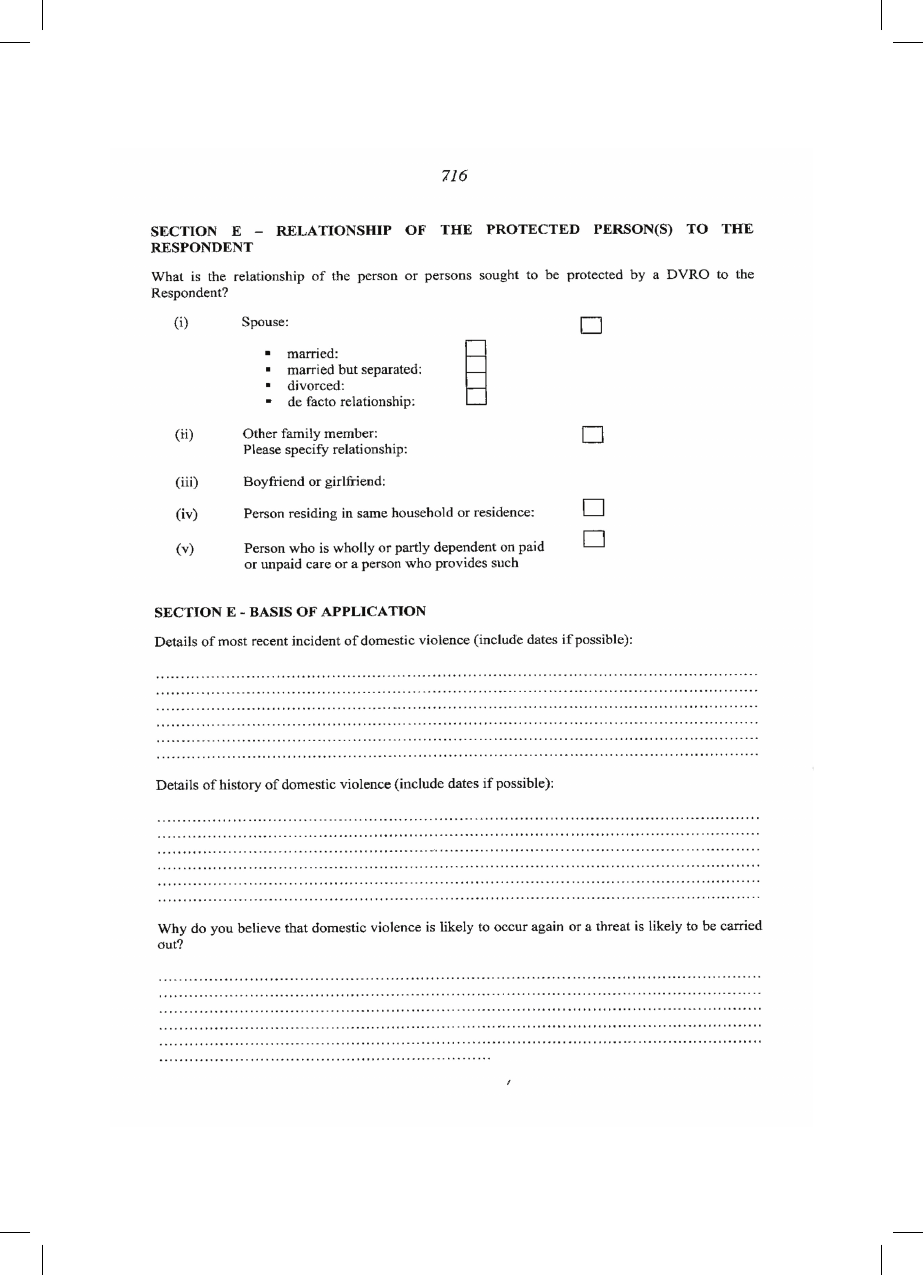
83
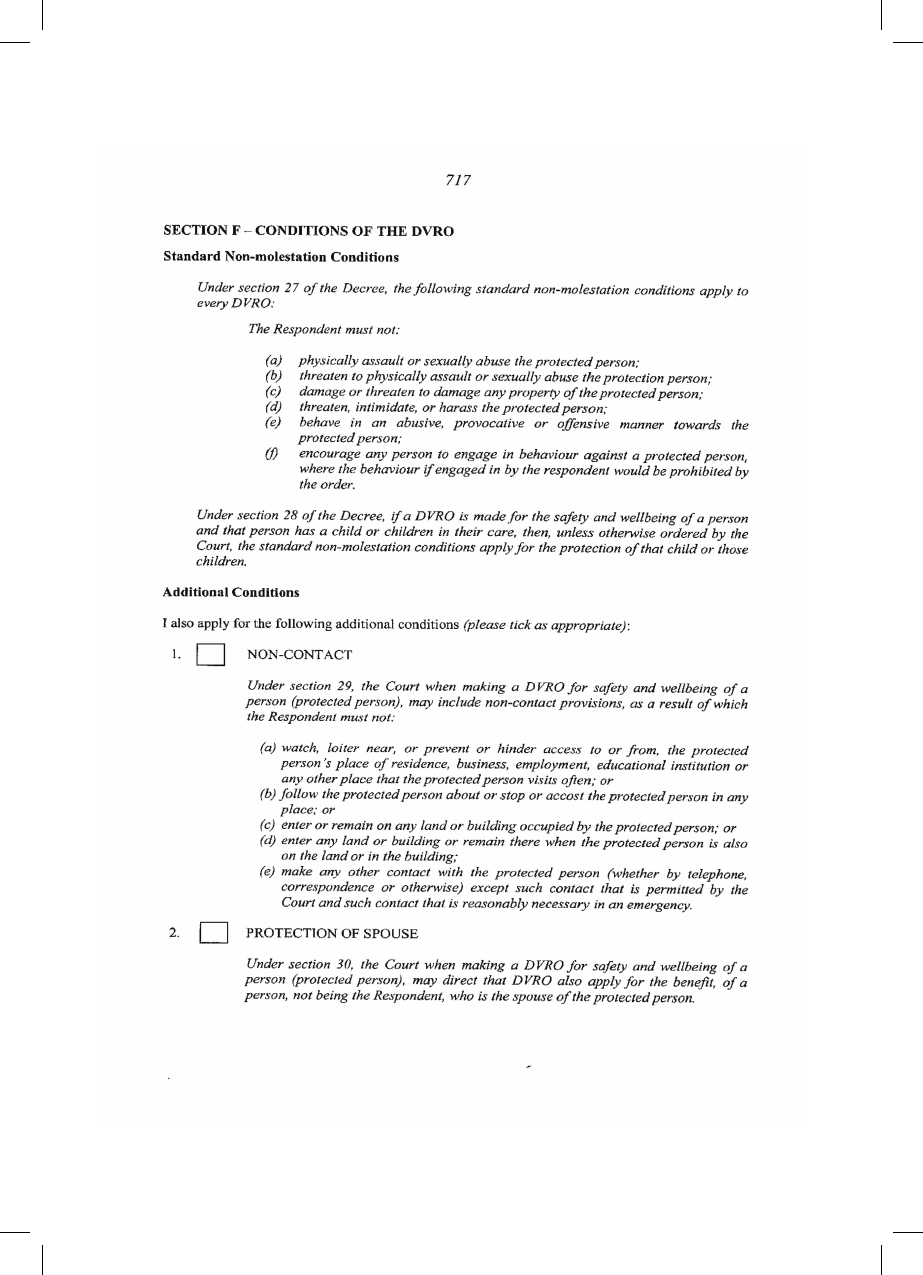
84

85
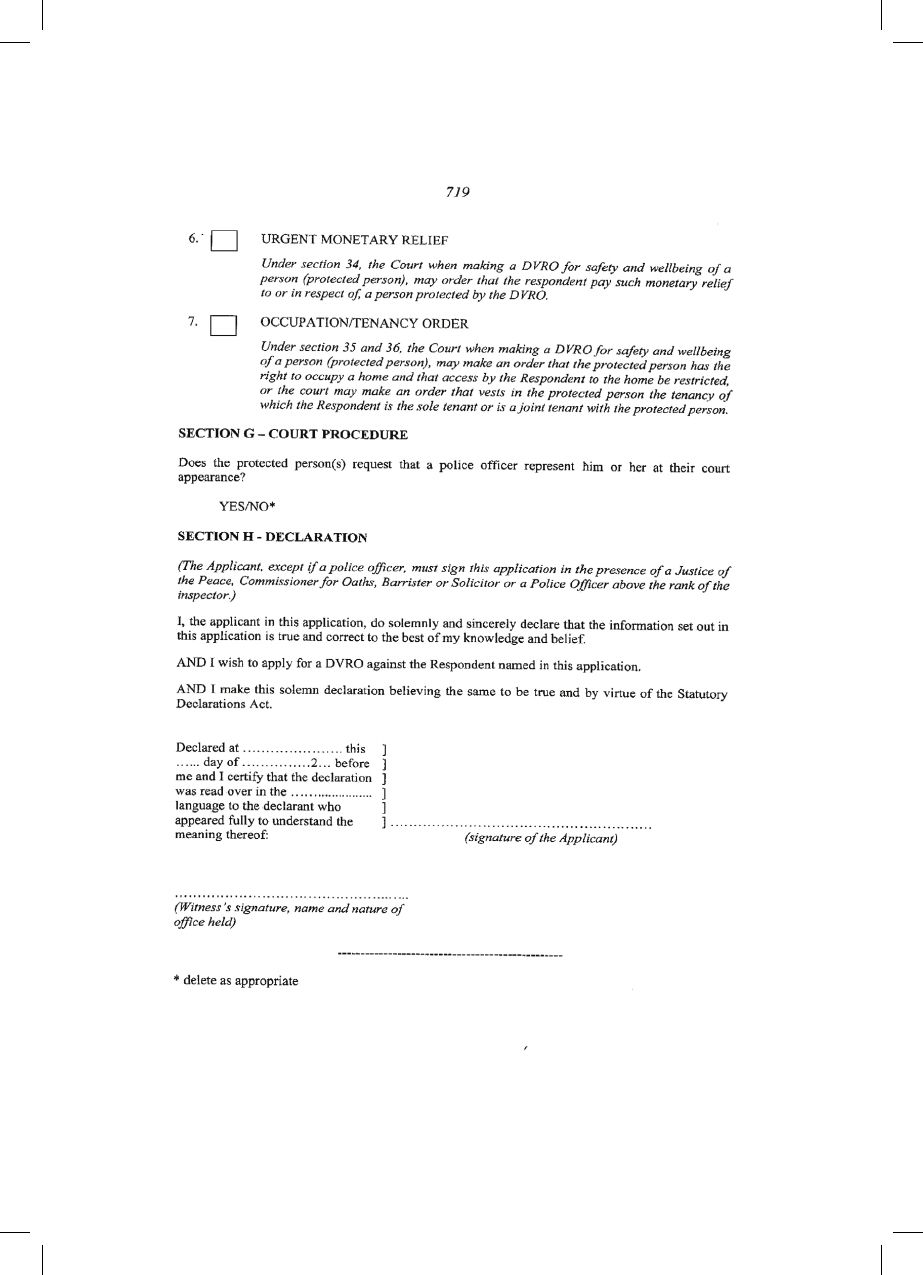
86

87
Annex 4: Domestic Violence Complaints Notice

88

89

90
Annex 5: Child Welfare Act Notication Form

91

92
FIJI National GBV Sub Cluster Guidance on GBV Case Referral
Guide for Referrals of GBV Survivors – TC Winston
Ensure a survivor centered approach. Refer survivors of GBV to essential services, using key guiding principles of respect, safety,
condentiality and non-discrimination. This is not intended to replace existing protocols, but rather to guide first responders in TC Winston.
A survivor discloses an incident of gender-based violence (rape, sexual assault, domestic
violence, exploitation, stalking, verbal abuse): Please take the following steps:
Benefits and Risks for Seeking Help: For survivor information/informed consent:
IF THE SURVIVOR HAS GIVEN PERMISSION TO REFER:
FOLLOW GUIDELINES BELOW FOR PRIORITISING CARE REFERRALS
After an immediate response, follow up actions and services may include:
DO’S
1. Provide immediate emotional support. Comfort the survivor
and tell her it is not her fault. Believe her.
2. Provide a safe environment for her. If a woman is with her
partner it will not be safe for her. Do not talk to her partner.
3. Be attentive and listen carefully, give the person time to say
what they want to say.
4. Remember confidentiality is crucial to her safety. Keep her
personal information confidential. Do not share with friends, family,
and acquaintance.
5. Respect the woman’s right to decide for herself what action
she wishes to take.
6. The safety of the survivor is paramount at all times.
7. Refer the survivors trained professionals as per the GBV referral
guidelines.
If the woman is extremely vulnerable (woman with disability,
pregnant,lesbian/transgender, and/or elderly) and needs support to take
action, with her permission,accompany her to a designated service
provider or appropriate leader
BENEFITS
l Immediate help and support from a trained GBV Counsellor
l Medical care within 3 days for Post-Exposure Prophylaxis, and within
5 days for Emergency Contraception/STI prevention
l Immediate help with safety and security
Sexual Violence
Ensure immediate
(within 72 hours)
access to medical care
l Ongoing counselling
and support
l Police
l Access to legal aid.
l Medical, counselling
l Legal aid
l Livelihood
opportunities for
rehabilitation
Prioritise Health Care/GBV Counselling/Advocacy
Health Referral: Divisional Hospital or MSP
FWCC or Empower Pacific Referral should happen simultaneously
Physical Violence
It is advisable to seek
health service
If there is a safety
risk and for legal
reporting
Prioritise Safety
& Security
* POLICE
* FWCC Referral should
happen simultaneously
Psychosocial Support
FWCC or Empower Pacific
Psychological
& Emotional
Violence
DON’TS
1. Don’t ignore the disclosure
2. Don’t blame the survivor
3. Don’t make choices for her
4. Don’t offer advice under any circumstance or attempt reconciliation
5. Don’t insist on joint meeting with her and her partner
6. Don’t recommend couple counselling
7. Don’t discriminate for any reason such as age, disability, religion,
ethnicity, class and sexual orientation.
8. When children disclose, don’t ignore.
9. Don’t touch survivors.
10. Stay calm, don’t overreact.
11. Do not take photos of the survivor or call the media
Handling Child Cases (18 years and younger):
Call Child Help Line (1325)
1. Ensure the child is referred to a mandated professional (Social
Welfare Officer, Medical practitioners, Police, School teachers) s4
Child Welfare Decree
2. Follow the referral process below
RISKS
l Possibility that confidentiality will be compromised in the referral
process. Referral to trained providers can help to lesson this risk.
l Possible safety risk so need to discuss with survivors themselves
about their situation.
l Possible insensitive response by service providers who are not
trained properly.
Annex 6: GBV Referral Pathway Developed for Emergencies/Disasters


